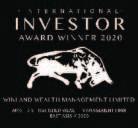








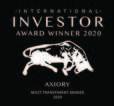

The build-up to the 2020 US election has been like nothing we have witnessed before. More than 75 million Americans have voted early and nearly 50 million of them by post, in a surge driven by the covid-19 pandemic. With deep-running divisions between the two presidential “rivals” and their supporters, as well as Amy Coney Barrett’s appointment to the supreme court, the polarisation of US politics has rarely been more stark. As the world waits with bated breath to see who will emerge victorious, can anyone answer how this election will impact the US investment scene (p.12).
This year has seen many businesses forced to adjust to a “new normal” imposed by a deadly virus. In our final edition of 2020, a number of our interviewees detail their response to the challenges they have faced this year but what of the future? We examine how Islamic Finance could be the way forward in helping navigate the ever-increasing economic turbulence (p.48).
From one crisis to another, almost daily a new report describes the perilous extent of why the climate crisis cannot be ignored. We look at the role that climate risk reporting has to play in this crucial matter (p.20) and whether a circular economy could be the answer to a new, more prosperous future (p.8).
The financial industry is also beginning to wake up to the importance (and benefits) of gender inclusion. Anastasia Soloveva, CEO of Athena Bank, reveals the value of financial education for women (p.18) and we profile the ‘Making Finance Work for Women Virtual Summit’ (p.32). In addition, we speak to Areej Mohsin Darwish, Oman’s Businesswoman of the Year, about the challenges of leadership and her rise to the top (p.66).
And what better way to end the year than recognising the hard work and perseverance of organisations across the globe. My sincere congratulations to all individuals and companies that have bagged International Investor awards (p.69).
Raj Kaur Editor
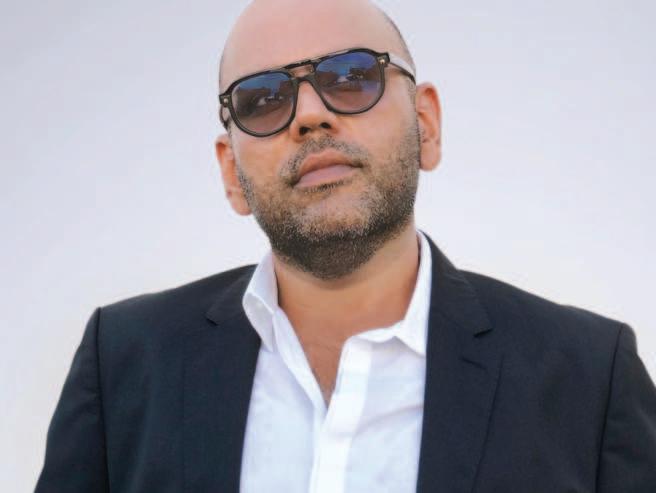
08
How history has forged the path to a circular economy
Looking back at how the global economy has evolved from the prescience age to post-digital
12 The impact of the US election on the American investment scene
How will the result affect policies and international relations?
16
Perfecting the art of service
The Okkami digital solution to ef昀椀ciency whilst maintaining customer satisfaction

20 Climate’s risky business
Adapting business practices to challenges posed by climate change
24
Investing in young companies
Chief Strategy Of昀椀cer at FX Primus, Manmohan.S shares his story to being awarded most trusted broker in his region
32
Making Finance Work for Women
The annual summit explores how to help women recover from the current economic and health crises

34
Investing in Cannabis
The potential investment in weed as more nations legalise cannabis
38
Taking the FX industry by storm
How Tomasz Wisniewski from Axiory Intelligence has risen the ranks
40 Invest in Sharjah
Driving the continued transformation of this Arab emirate

42
The changing landscape of trading
How the pandemic and traders from different backgrounds are transforming the trade scene
44
Postal voting in the US election
What is the controversy and will it affect the outcome?
48
Islamic Finance in tackling Covid-19
Could Sharia-compliant 昀椀nance be the answer to economic challenges posed by the pandemic?
52
Behind the scenes of an award-winning platform
We ask Bybit what’s their secret to success in such a competitive industry
58
Scaling 昀椀nancial reporting accuracy
Private Wealth Systems’ CEO, Craig Pearson, explains how data accuracy can cost a 昀椀rm
66
In conversation with... Areej Mohsin Darwish
The Outstanding Businesswoman of the Year winner reveals what it takes for a woman to succeed

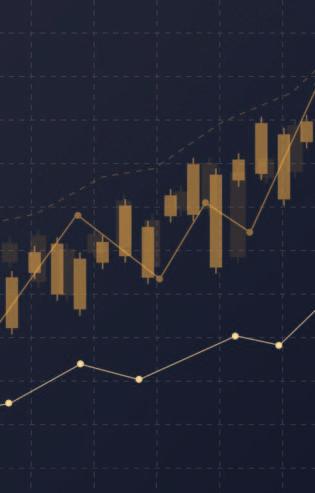

By Harrison Wavell, Schools & Colleges Programme Manager, Ellen MacArthur Foundation
Put simply, the circular economy is a way of designing, making, and using things within the limits of the planet. And yet for anyone truly engaged in the topic there is something intriguing about it, a sense that, behind this simple idea, there is a far richer story.
For the sake of simplicity, we can split this story into three parts: the pre science worldview, the scienti昀椀c worldview of the enlightenment, and the emerging worldview of the digital age.
In the pre-science worldview, our understanding of the universe came about primarily through observation of our natural surroundings coupled with intuition and religious precepts. We had no reliable frameworks or theories for guidance. The constants that guided life were the divine entities embodied in the sun, moon, stars, and seasons. Religion not science explained how the world worked: in essence, that humanity was at the mercy of the Gods whose heavenly will was re昀氀ected on Earth.
This was a period marked by radical changes in perspective and ideals, culminating in a fervent belief in the power of the rational mind to transform humanity. The result was a number of important inventions, books, essays, discoveries, laws, and two signi昀椀cant revolutions: The American Revolution (1775–1783) and the French Revolution (1789–1799).
One of the era’s most signi昀椀cant breakthroughs was Isaac newton’s ‘Philosophiae naturalis Principia Mathematica’ (Mathematical Principles of natural Philosophy) published in 1687. In it, newton set down the three laws of motion and the law of universal gravity that would become the building blocks of modern physics.
During this time of discovery, science took centre stage leading to a new worldview that would eclipse the old. Humanity was no longer positioned at the fringes of the universe, helpless and at the mercy of the Gods, but instead placed at the centre of it, able to measure and quantify the physical world and understand its laws through careful analysis.

The best we could do was to be in accord with these powerful forces and hope that through‘correct’ action the Gods would look favourably upon us. This conception of the world can be seen in the myriad elements of ritual and sacri昀椀ce common to early polytheistic cultures. Human sacri昀椀ce, as a means of appeasing the Gods in the hope of a good harvest or good hunting, for example, was common to the ancient Egyptians and the Aztecs.
The spiritual world was all important because it was seen as indivisible from the physical world; even to the point that man’s creative inspiration came from Gods or muses. The word ‘inspiration’ stems from the latin ‘inspirare’ (‘to breathe or blow into’) which came to be used in early forms of written English in the 昀椀gurative sense of being ‘moved by divine guidance’.
Between the 14th and 17th Centuries, the cultural movements of the Renaissance and Humanism gathered momentum, laying the seeds of a new worldview that would grow to maturity around the time of the Enlightenment (17th and 18th Century Europe). German philosopher, Immanuel Kant, summed up this era in the following terms: “Dare to know! Have courage to use your own reason!”
Ultimately, this gave rise to the three pillars of the scienti昀椀c worldview that continues to dominate our thinking to this day: understand, predict, and control. The underlying metaphor in this worldview is the universe as machine or mechanism. From this perspective, the universe is a clockwork system of interlocking parts that follow a basic set of laws. It is logical, measurable, and predictable because it operates on mathematical principles of cause and effect.
Pierre Simon Laplace (1749-1827) captured this notion clearly in his work A Philosophical Essay on Probabilities when he wrote: “We may regard the present state of the universe as the effect of the past and the cause of the future. An intellect which at any given moment knew all of the forces that animate nature and the mutual positions of the beings that compose it, if this intellect were vast enough to submit the data to analysis, could condense into a single formula the movement of the greatest bodies of the universe and that of the lightest atom; for such an intellect nothing could be uncertain and the future just like the past would be present before its eyes.”

Interestingly, faith in God was still very much alive (newton wrote more about alchemy and the Bible than he did about science) but the physical and spiritual worlds became separated where once they had been indivisible.
In western civilisation, this underlying assumption about the universe (as a machine) has permeated all spheres of life - social, cultural, and scienti昀椀c. And it has, of course, furnished us with the scienti昀椀c method of reductionism: understanding the whole through analysis of the parts.
The Father of Modern Philosophy, Rene Descartes, described the reductionist method perfectly in his 1637 publication A Discourse on the Method: “To divide all the dif昀椀culties under examination into as many parts as possible, and as many as were required to solve them in the best way... to conduct my thoughts in a given order, beginning with the simplest and most easily understood objects, and gradually ascending, as it were step by step, to the knowledge of the most complex.”
We have become so adept at using this method, which is now so ingrained in western thinking and education, that we now use it unconsciously in our approach to all manner of problems. This is useful for dealing with problems rooted in linear cause and effect such as how to 昀椀x an engine, but potentially harmful when applied to highly complex and dynamic problems such as how to tackle climate change.
THE EMERGING WORLDVIEW OF THE DIGITAL
“Science has explored the microcosmos and the macrocosmos; we have a good sense of the lay of the land.
The great unexplored frontier is complexity.”
Heinz Pagel, The Dreams of Reason (1988)
With the arrival of the digital age and the power to compute unprecedented amounts of data, came new insights that cast doubt on the certainties of a deterministic scienti昀椀c worldview. Progressively, the scienti昀椀c pillars of understanding, prediction, and control began to erode. new discoveries would prove that the universe is dynamic and nonlinear, full of interdependence and feedback. We can observe and come to recognise certain patterns, but we cannot predict or control the outcomes.
Human beings have understood this intuitively for Millennia. After all, it was Aristotle who said: “The whole is greater than the sum of its parts.” But until very recently we have lacked the tools to make sense of this complexity. now that we have those tools, we are witnessing the emergence of a new type of science known as Complexity Science (the study of complex systems). Complexity examines the nature of the relationships that exist in complex phenomena, how elements combine to produce an effect on the whole that is supremely greater than the capabilities of those individual elements. In order to have any kind of grasp on complex systems, proponents argue that we need to break out of the con昀椀nes of linear reductionist thinking and start thinking in systems.
In her book, Complexity: A Guided Tour, Melanie Mitchell writes of complex systems: “no-one knows exactly how any community of social organisms - ants, termites, humans - come together to collectively build the elaborate structures that increase the survival probability of the community as a whole. Similarly mysterious is how the intricate machinery of the immune system 昀椀ghts disease; how a group of cells organises itself to be an eye or a brain; how independent members of an economy, each working chie昀氀y for its own gain, produce complex but structured global markets; or, most mysteriously, how phenomena we call ‘intelligence’ and ‘consciousness’ emerge from non-intelligent, nonconscious material substrates.”
So what is the universe like if not like a machine? Science is now showing us that a better metaphor is one more rooted in living systems: as something alive, in 昀氀ux rather than stasis, adapting and evolving in response to feedback in in昀椀nite, unpredictable ways; more akin to a murmuration of starlings than a series of cogs whirring in a clock. This is important. As cognitive linguist George Lakoff reminds us: “metaphors are capable of creating new understandings and, therefore, new realities.” Of course, we don’t all share the same reality: indigenous peoples the world over have long identi昀椀ed with this conception of the universe as a living, breathing entity.
Where the western mind sees a world of inert things, the indigenous mind sees a world of process and relationship.
While this shift, her alded by new scienti昀椀c discoveries, might be underway, we should be careful not to do away with the mechanistic mindset altogether - it has, after all, helped humanity enormously. The Industrial Revolution was built on such principles and helped lift millions out of poverty into prosperity. The great thinkers of the future are likely to be those that can pick and choose perspectives and approaches (reductionist and systems) and apply them in their correct context, skilfully weaving the two, able to adopt a systems approach as intuitively as we now use the reductionist.
The below graphic captures the shifting focus from an educational standpoint as we approach a new way of understanding more 昀椀tting for the 21st Century.

The circular economy, as an idea, is indicative of this greater shift at play. Inspired by the principles of nature, it is entirely consistent with notions of process and relationship, of 昀氀ux and 昀氀ow rather than stasis. With 4.6 billion years of evolutionary tinkering behind it, why would we look anywhere else for inspiration?
As circular economy pioneer Ken Webster points out in The Circular Economy: A Wealth of Flows, the circular economy is “about the possibilities of abundance, of meeting people’s needs by designing out waste, and recreating the kind of elegant abundance so evident in living systems.”
In many ways we are coming full-circle, with a new scienti昀椀c understanding beginning to illuminate and reinforce aspects of our pre-science worldview, which, hopefully, will set us on a more harmonious path of living.
Seen in this context, the circular economy represents a lot more than just a clever way of using resources. The growing interest in the concept may be the outward sign of a deeper shift marking the beginning of a new and more prosperous future.


This autumn, the world will witness one of the most awaited presidential election in US history. On 3rd november, Americans will vote to elect the leader of the world’s biggest economy and one of the largest military structures. Understandably, the election’ outcome will signi昀椀cantly impact reforms, policies, and international relations.
According to a survey from the asset manager Hartford Funds, 93% of investors believe the presidential race will affect the stock market, while 84% admit they expect to change their investing habits as a result.
But should they? Let’s pull the curtain and 昀椀nd out what history can say about it…
Historical data reveals that markets’ behavior depends on whether we are looking at the midterm election years, the pre-, or post-election period.
A review of market data of the S&P 500 for the last 90 years suggests that equity and bond markets tend to behave more calmly in the 12-month run-up period prior to the presidential elections. Compared to non-election years, they have produced between 1.00% and 2.5% fewer gains (6.00% vs. 8.5% for the stock markets, and 6.5% vs. 7.5% for bond markets).
Data about DJIA indicates that, since 1833, the index has averaged 10.4% in the pre-election 12-month period, compared to 6% during the election year. According to JP Morgan Asset Management, the S&P 500’s historical volatility had been higher in election years. The reason is that investors try to “price” the probability of the candidates’ ideas.
On the other hand, the post-election period is marked with relatively lower stock market returns, with an af昀椀nity for bonds to outperform slightly. U.S. Bank Wealth Management division’s reports reveal that the stock market consistently beats projections in the year after the midterms.
When it comes to the effect of the winner’s political party af昀椀liation, conventional wisdom reveals that markets should react more positively when a Republican president is elected as the ideas are considered more market-friendly. Looking back to data collected since 1900, however, Democrat-elected presidents have been more favorable for stocks, with the DJIA averaging 9% compared to 6% for Republican presidents.
According to Russ Koesterich, chief investment strategist at BlackRock, normal variations in annual stock market returns will mitigate the difference. That is why, today, most analysts suggest that there is no difference in which party takes control over the White House. In the end, the market retains its long-term growth either way.

Source: Capital Group
The thing that can affect the market more notably is whether there is a shift in power. According to some reports, when a new party comes, stock market gains usually average 5.00%. On the other hand, when the president is re-elected, or the same party retains control, the returns average 6.5%. The reason for markets to react more positively to the latter is that they already know what to expect, and the uncertainty is lower.
However, all this could turn out wrong if the candidates give investors a major reason to start a selloff.
When it comes to the Fed, the common narrative is that it is “election neutral” as it tries to maintain a more quite policy in election years to avoid destabilizing the situation
The historical records reveal that since 1948, the US economy performs slightly better in election years. GDP growth is higher with 0.3% on average, while potential growth outperforms by 0.4%. The reason is the expansionary 昀椀scal policy of the cabinet in charge ahead of elections.
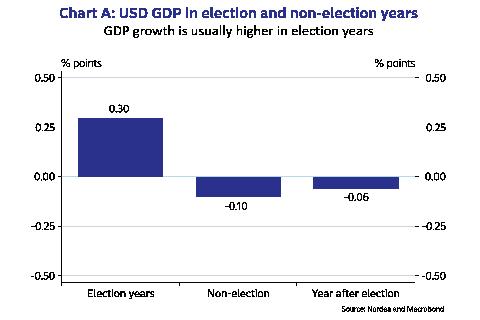
An important remark is that, since 1932, an incumbent US president has never failed to win re-election, unless a recession unfolded during his time at the of昀椀ce.
If we are to analyze the presidential race at any other point in time, we would usually consider common factors like the state of the economy, the candidates’ ideas about 昀椀scal and monetary policy, views on international relations, proposed reforms, etc.
However, the equation in 2020 has a unique variable - the COVID pandemic. President Trump’s handling of the health crisis was a total disaster. The US was hit the hardest, with close to 200 000 deaths. In comparison, the EU lost approximately 15 000 fewer lives, despite its signi昀椀cantly bigger population.
The pandemic has brought uncertainty to the markets and further distorted investors’ perspective. And markets hate uncertainty. According to a 2019 Dimensional Funds report, for the period 1928 – 2016, negative market returns arose only four times, all of which accompanied by geopolitical events leading to global instabilities and market uncertainty.
All this in addition to the looming economic recession, and we have the reason why Mr. Trump went from a favorite to an underdog in the span of six months. Survey data from the Pew Foundation revealed that over 67% of the Biden voters are more like “anti-Trump” votes.
At the start of this year, the consensus was that Donald Trump would be re-elected easily, due to the resilient US economy and his favorite metric – the performance of the S&P 500. Fast forward to a month before the elections, and polls and betting markets indicate a convincing victory for Joe Biden. Even the nasdaq index that moved in line with Trump’s positive re-election prospects, now keeps climbing, despite his diminishing chances

Source: FT
Trump’s international policy and the trade war were at the core of the global manufacturing slowdown, which indicates that a potential second term will further increase the risk of escalation. In such a scenario, the most affected will be international stocks like European carmakers, for example. U.S. equities are expected to continue their rise thanks to Trump’s pressure on the Fed, the tax cuts, and the deregulation.
However, according to Stephanie Link, chief investment strategist and portfolio manager at Hightower, the market would favor a scenario where Trump is re-elected, and the Congress is split between both parties. She adds that small companies and sectors like 昀椀nancials, technology, and traditional energy might rally on the news.
For quite some time, the Democrats couldn’t come up with a clear campaign candidate. While Elizabeth Warren and Bernie Sanders advocated for radical policy changes, including going against the big banks and tech 昀椀rms, banning fracking, imposing wealth taxes, and increasing the corporate taxes, Joe Biden’s policy is more moderate. Although he still plans to reverse tax cuts, markets are likely to take a Biden win as mildly positive news.
According to Link, a small selloff between 2% to 4% might be plausible, creating “buy-the-dip” opportunities for investors in pharmaceutical and tech stocks. On the other hand, infrastructure, clean energy, and healthcare services companies are projected to do well. Link also believes a scenario where Biden wins, and the Congress remains split between both parties will lead to a market rally.
Lizz Ann, Charles Schwab’s chief investment strategist, shares similar ideas, admitting that a Biden presidency won’t be “a guaranteed disaster for the stock market”. According to JP Morgan’s analysts, such a scenario can even have a neutral-toslight-positive effect on markets. Their conclusions lay on Biden’s proposed policies, including infrastructure spending, softening on tariffs, higher wages, and a generally more diplomatic approach, which should lower the volatility levels and increase the aggregate demand.
According to JP Morgan’s forecasts, even a partial reversal of Trump’s Tax Cuts and Jobs Act (TCJA) bene昀椀ts will send rates back up to 28%, leading to a hit on S&P 500 of up to $9 per share. However, they also conclude that, in COVID times, the more likely scenario is a prioritization of job growth over policies that threaten economic growth. According to the bank’s analysis, the potential outperformers in such circumstances are expected to be companies like Tesla, Johnson & Johnson, and Boeing. Similar views are also shared by the UBS Chief Investment Of昀椀ce, which projects a mounting pressure on heavy industries and carmakers due to Biden’s greener agenda. Such a scenario will also lead to bene昀椀ts for Asian solar and biotech companies.
UBS Wealth Management suggests that after the elections, some initial volatility might be expected, but the good thing is it would be short-lived until investors learn to manage the uncertainty surrounding proposed policies. However, the volatility might be higher if the result is inconclusive. Still, according to Thomas McLoughlin, Head of the Americas Fixed Income division at UBS Global Wealth Management, even then, it will weaken over time and won’t justify shifts to safe-haven assets.

Morgan Stanley predicts that, in a situation with a Republican President and Senate and a Democratic House, we might witness short-lived recession and continuing deregulation that bene昀椀ts the energy, telecom, and asset management sectors. In a scenario with a Democratic President and House and a Republican Senate, the bank predicts pressure on the 昀椀nancial, energy, telecom, I.T., and pharmaceutical sectors, accompanied by better handling of the pandemic. Considering that the 昀椀ve FAANG stocks (Facebook, Amazon, Apple, Net昀氀ix, and Google) are 20% of the U.S. stock market and are currently pushing it up, the whole market might suffer if they come under scrutiny.
In case Republicans win all three, the bank expects a V-shaped recovery, with an extension on the expiring tax provisions and a massive anti-China policy. This would lead to a strong dollar and potentially weakened T-bonds. Again, U.S. energy, telecom, and asset management shares are expected to bene昀椀t. In an all-democratic leadership, Morgan Stanley projects high infrastructure spending and expansion in the healthcare sector, accompanied by higher interest rates and in昀氀ation. The likely winners from such a scenario are healthcare, international oil and natural gas, transportation, and large-cap banks, with potential dips in pharmaceuticals.
The consensus among experts is that, although investors might be tempted to make bold moves and capitalize on the political uncertainty, it is better to retain their long-term approach. The reasoning is that economic cycles last much longer than presidential terms.
Instead of focusing on capturing the short-term volatility, investors should be aiming at portfolio evaluation that takes into account new policies with the potential to impact their long-term performance.
According to Tony DeSpirito, Co-manager of BlackRock north American Income Trust, investors should be looking at highquality sectors such as technology and healthcare that can offer long-term growth in either scenario. Jonathan Simon, Manager of JPMorgan American Investment Trust, suggests looking for companies that have proven to be adaptable and capable of overcoming unexpected crises. On the value side of the portfolio, he provides Booking.com as an example of a business that should be highly affected by the pandemic but manages to adjust its cost structure and come out even stronger.
The UBS Chief Investment Of昀椀ce’s advice for investors is to adhere to a strategic portfolio allocation with long-term goals in mind. This includes anything from automation, biotechnology, and renewable energy, to sectors that will bene昀椀t from global trends like globalization.
If investors want to hedge against the uncertainty of presidential elections, they should consider sectors and companies with no US exposure. This translates to a global, multi-asset portfolio that is resilient to industry- and regional-speci昀椀c risks and with
the potential to bene昀椀t from all election outcomes. Examples include domestically-oriented niches like utilities or stable sectors like consumer staples. There are also investment opportunities, projected to do well in either outcome, including sectors exposed to infrastructure and technology investments.
All analysts are united by the idea that a Biden presidency will favor emerging markets and foreign equities. According to JPMorgan, equity returns in emerging markets are projected to surpass those of other markets in the upcoming years, which means they should be prioritized when building or rebalancing a long-term portfolio.
In a nutshell, the cream of the crop on Wall Street doesn’t see the need for any drastic changes in well-diversi昀椀ed and balanced long-term portfolios. And there is sound reasoning behind this.
As the nobel-laureate Paul Krugman states in his new York Times opinion pieces, nowadays, the economy and the stock market can’t be further away from each other. The Federal Reserve Bank of new York’s weekly economic index indicates that the economy is still more depressed than it was at any point during the post2008 recession. There are 11.5m fewer jobs in the US economy than February this year.
There is an old economists’ joke that the market has predicted nine of the last 昀椀ve recessions.
Yet, despite the economic doom and gloom and the deepening implications of the pandemic, the market is soaring. At the start of September, the S&P 500 hit an all-time high, while Apple surpassed the $2 trillion valuation mark.
A partial reason for the dissonance is that over 50% of all stocks are currently owned by 1% of Americans. The rest 50% own just 0.7% of the market. The rumor on Wall Street is that we should brace ourselves for a “K-shaped recovery” that will materialize in rising stock valuations and individual wealth for the richest, and falling incomes for the poorest.
What all this comes to show is that despite what the theory says, presidential elections might not have a signi昀椀cant effect on your portfolio if it is well-diversi昀椀ed. Economic policies, investments, geopolitical ideas – all these factors will most likely affect your investments in the short-term, but they don’t have a major role in long-term planning.
This article does not constitute investment advice. It is a general communication being provided for informational purposes only. It is not designed to be taken as advice or a recommendation for any speci昀椀c investment product, strategy, plan feature or other purpose in any jurisdiction.

As the hospitality industry shifts to a “new normal”, digital services and technology are needed more than ever to facilitate a more ef昀椀cient yet personalised customer engagement solution.
OKKAMI is an all-in-one hospitality platform that allows hotels to focus on their core business. The OKKAMI digital solution enables hotels to increase revenue centres, streamline operations, connect with customers, and improve guest satisfaction. OKKAMI specialises in a touch-free experience such as contactless express check-in/out with digital signature, QR code menus, digital compendium, and more. The OKKAMI solution supports safety & hygiene programmes from established brands like Chatrium, Six Senses, Anantara, Avani, and Akaryn.
OKKAMI’s main centre of operations is located in Bangkok Thailand. Operating out of Bangkok which is the heart of travel in Southeast Asia has provided OKKAMI keen insight on trends which have affected the local economy. Every country in Southeast Asia is preparing steps on how to kickstart their local tourism industry safely. Thailand has successfully achieved a low infection and mortality rate during the pandemic, but since the local economy depends on tourism, hotel owners are struggling to generate revenue. Staying open means jobs for locals and expatriates that work at the hotels and related companies. The Thai government has been instrumental in helping promote domestic tourism by providing extra approved government holidays to simulate local travel.
As Thailand opens for tourism, incoming guests will be required to stay at Government Approved Hotels which have strict protocols in place to isolate and safely manage any potentially infected guest. As such OKKAMI has pledged to provide SHA (Safety and Health Administration) approved hotels in Thailand complimentary services for six months. Key features found in the complimentary package will include the OKKAMI live chat uni昀椀ed messaging software and QR code digital menus. Each QR Code Digital eMenu also supports multiple languages and automatic translations when customers use the chat function.
By doing so OKKAMI hopes to address safety & hygiene concerns that hotels are currently facing. Addressing these issues will allow hotels to stay open, prepare for re-opening, and provide assistance for new hotel openings. These features are designed to help minimise physical interaction between staff and guests while allowing staff to continue to offer personalised services. Guests can now order in-room dining menus from the comfort of their rooms by scanning the QR code or chatting with hotel staff
directly. By supporting menus in various languages, OKKAMI will help SHA approved hotels cater to guests from all corners of the globe.
The OKKAMI LiveChat Uni昀椀ed Messaging module combines the ease-of-use of guests’ preferred messaging tools with the personal touch of the property’s concierge. With OKKAMI messaging you can also offer website chat support as well as messaging support through popular Apps such as WhatsApp and Facebook Messenger with the added bene昀椀t of supporting in-chat payments. The currently supported applications are WhatsApp, Facebook Messenger, Telegram, Viber and WeChat. All of the applications directly feed into the OKKAMI Uni昀椀ed Message Manager Dashboard.
The OKKAMI LiveChat Manager Dashboard includes the OKKAMI payment gateway, which allows hotels to capture payments for services such as early check-in, airport pickup and other special packages before guests arrive. The payment gateway feature helps properties capture lost revenue even before the guest arrives.
OKKAMI understands that for today’s’ travellers time is limited and that smart technologies help improve the guest relationship services which hotel brands are built on. This is why OKKAMI has developed an all-round cost-effective and seamless communication solution between hotel team members and the guests.
The advantage of the OKKAMI Uni昀椀ed Messaging software is that the guest can communicate with the property before, during or after each stay. Guests simply send their query and receive an immediate reply from the respective hotel. The Message Manager Dashboard also displays the guest pro昀椀le and the response can be customised to each guest’s personal preference.
The OKKAMI LiveChat module also makes it very convenient for guests to easily make a restaurant booking or schedule an inproperty spa appointment. With the added bene昀椀t of the hotel being able to request and capture immediate payments results in an increased revenue stream for the property.
Six Senses has partnered with OKKAMI to create a uni昀椀ed inventory management platform for all of their properties. This will enable the Six Senses group to manage the life-cycle of their

products, services, customers, and resources. Aside from the advantage of being cloud-native and highly 昀氀exible, the platform is also available across all property classes and geographic regions. OKKAMI will provide an API to allow Six Senses website to present room inventory from IHG’s booking engine while offering add-on products stored on the newly created API. An added bene昀椀t of the API is the ability for guests to view available inventory of experiences based on selected dates online. The goal of this integration is to maintain the existing booking 昀氀ow while con昀椀guring a direct work昀氀ow to route add-on products to the assignment department after guests have completed their bookings. Once the request arrives at the property, OKKAMI’s work昀氀ow module will map the request to the correct department for ful昀椀lment and follow up. This would allow, for example, spa add-ons to go directly to spa staff onsite to follow up with guests before arrival.
The booking 昀氀ow begins with guests accessing room inventory based on availability pulled from IHG’s booking engine vs SynXis Central Reservation. Based on the guests’ selected property, available product inventory will be displayed accordingly. Products that are dependent on dates and inventory available will be able to be 昀椀ltered based on dates entered during the booking process. For example, a one-way transfer can have inventory allotments based on the arrival date. In the last step of the booking process, total booking rate and total add-on cost will be displayed. Guests’ data collected during booking will be sent back via the API to route add-on requests to the property’s departments.
Once an order is posted via the API, the department lead and relevant staff will be alerted. Alerts are sent to emails, Six Senses app push noti昀椀cation, and OKKAMI’s dashboard popup noti昀椀cation. Once staff have reviewed the add-on request, it can be moved to “Scheduled”. As soon as an order is marked as “Scheduled”, it will automatically move to the top of the list on the day of the guests’ arrival. This acts as a reminder for staff to ful昀椀l the request before the guests arrive.
To assist staff with the follow-up process, OKKAMI has built an escalation feature into the ful昀椀lment dashboard. The escalation feature ensures no requests are left unattended by escalating the request to the next available team member if the request has not been marked “Done” after a speci昀椀c time. The escalation will continue to occur until the request status has been changed.
Once the order has been posted, guests will receive a noti昀椀cation on the Six Senses app and details will also be displayed in the chat message. From the chat, staff and guests can communicate directly. Moreover, guests can review their add-on requests by browsing through the “My Request” panel or “Pro昀椀le History” inside the app. All requests are collected in a guests’ pro昀椀le and are connected to OKKAMI’s powerful CRM system. Guests data and preferences are shared among all Six Senses properties, allowing staff to offer personalised services and anticipate guests’ needs no matter which property they visit.
Inventory and add-on products are managed from a comprehensive store builder. Each product will support manual updates of basic data 昀椀elds and image uploading. Moreover, the products support the ability to be 昀氀agged for online ordering through the API. OKKAMI’s user-friendly store builder allows staff to update the information once from a single dashboard and it will automatically update on all platforms.
Essentially, the uni昀椀ed inventory management platform is about managing connectivity, transferring information to and from devices and locations, and enhancing guest engagement. OKKAMI expects this uni昀椀ed inventory management system to help Six Senses better personalise their hospitality approach and cater to their esteemed travellers. Both companies share a vision to create personalised travel relying on world-class technology strategy and bold investments for the future.

It seems like new banks are continually popping up, offering the same services, and failing to stand out. nevertheless, are banks looking forward to who their future customers are? Who is going to hold assets soon, and how prepared are they?
Studies show that women will control two-thirds of the consumer wealth in the USA over the next decade, yet only 18% can pass a 昀椀nancial literacy test. In general, are banks appealing to female customers? If so, why is it that banks lose $700bn in pro昀椀ts from underserved female customers?
But once in a while, a different kind of bank comes along, not simply offering monetary wealth but also a wealth of knowledge. Athena is a 昀椀nancial education platform with a speci昀椀c target: young women starting their 昀椀nancial independence journey.
Anastasia Soloveva, the CEO of Athena, has worked in 昀椀nance for two well-known institutions in the past 15 years - Citibank and Credit Suisse. A graduate of Harvard Business School, Anastasia has worked as a wealth manager. During her time in the 昀椀nancial industry, she noticed a pattern; the people who were having the most dif昀椀culty managing their 昀椀nances were women.
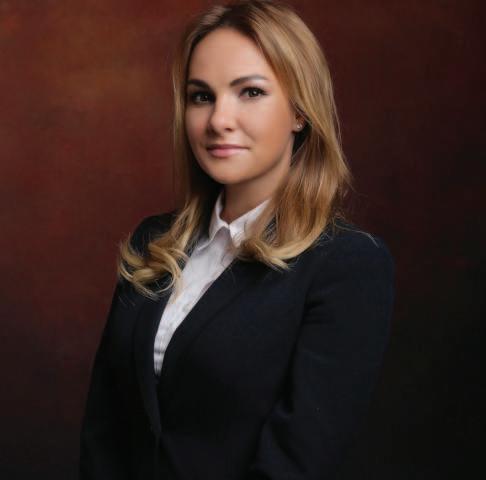
When most people think of 昀椀nance and gender, they think of the pay gap between men and women. However, that is only the tip of the iceberg. Women are living longer, but most of them have no long-term 昀椀nancial plan for their future. More than 80% of women cannot even pass a 昀椀nancial literacy test. In short, women are the largest group that is being underserved in the 昀椀nancial industry today.
The lack of 昀椀nancial education in women goes back to societal gender roles. For the 昀椀rst half of the 20th Century, most of the labour force was male. This has built up the widespread bias that men are more suited to handle 昀椀nances. There is also the longstanding presumption that women are meant to focus on raising children, not managing money. These stereotypes have helped feed into the gender pay gap. Working women receive 20% less income than their male counterparts, and those who try to negotiate for a bigger salary are seen as overly aggressive.
This disadvantage creates a problem for the future. Women are living at least 昀椀ve years longer than men, and many are going through a divorce. One way or another, most women will 昀椀nd themselves at a point where they cannot rely on men to take care of their 昀椀nances.
There have been a number of 昀椀nancial service companies popping up with women as their target audience. However, most of them focus more on acting as 昀椀nancial advisors rather than giving women the knowledge and resources to be 昀椀nancially independent.
That is where Athena Bank comes in.
Interviews with their customers gave Athena Bank a better understanding of what females are actually looking for on their platform:
• How to plan and take care of the future of their kids or grandchildren. That’s probably the number one 昀椀nancial goal they usually highlight.
• Personal goal: purchase a house, travelling around the world, or opening their own business - that’s another kind of 昀椀nancial goal we see.
• Education - many women worldwide are willing to get a master’s or MBA to push their careers further.
What the Athena platform offers are educational courses for women to learn the basics of handling their 昀椀nances. These courses cover many issues such as investing and budgeting. Athena have gone out of their way to put together a primarily female team to assist with content, marketing, and fundraising.


Climate-linked natural disasters and increasingly gloomy scienti昀椀c outlooks are pushing the international business community to think more about climate risk, as governments start to factor it into their policies.
The effects of climate change - which include extreme weather events and higher temperatures - are becoming more pronounced and more worrying, leading to growing concerns about their human and economic impact.
According to the World Economic Forum’s 2020 Global Risks Report, environmental factors top the list, although the virus outbreak has to some extent replaced those concerns in the most recent rankings.
Some sectors and businesses are more exposed to climate breakdown than others: European companies that rely on inland shipping are at risk because of drought, while gas and nuclear power stations cannot run at full capacity when the mercury rises too quickly.
That is why there is now a trend of businesses being asked to disclose their climate risks, so that investors can build long-term trust in projects without fear that they are, for example, funding soonto-be stranded assets.
“Scienti昀椀c advances mean that climate risks can now be modeled with greater accuracy and incorporated into risk management and business plans,” said John Drzik, Chairman of Marsh & McLennan Insights.
Aside from the business side of matters, regulators want climate risks declared so that global and regional emissionscutting targets can be met. Without the involvement of companies in that process, vulnerabilities in economic systems could 昀氀y under the radar.
The next 12 months will be a hot-bed of climate policy-making as administrations on both sides of the Atlantic potentially gear up to pursue new green agendas. In Brussels, EU heads will decide whether to ratchet up all the legislation linked to curbing greenhouse gas output - from car CO2 standards to renewable energy benchmarks - with tough talks scheduled for the next 10 months or so.

Lawmakers have already agreed on a ‘sustainable taxonomy’ that is designed to put a label on what is and what is not a green investment, while a €750 billion virus recovery fund will give priority to countries that submit risk-proofed applications.
Depending on who wins the US presidential race in november, a Joe Biden White House is also on track to implement environmental policies that are much more ambitious than previously seen in Washington.
In several countries around the world, climate risk is already enjoying spells in the limelight, to varying degrees.
norway, which boasts a €1 trillion sovereign wealth fund, is now asking the companies on its books to start disclosing more climate-related data, especially those 昀椀rms that are known to have an emissions-heavy output.
“We want scenario analysis, including a two-degree scenario analysis, and we want the company to be open about the assumptions for the analysis,” Carine Smith Ihenacho, the fund’s corporate governance of昀椀cer, said in August.
She added that the fund, which counts around 9000 companies in its portfolio, wants to be sure that they “can survive in a low-carbon society and to understand how they will address that”.
The fund’s drive for transparency is part of norway’s attempts to polish its international image as a green champion, because although it counts on massive clean energy reserves and is the world’s biggest user of electric cars, its oil and gas assets are problematic. In fact, the sovereign fund - set up to channel the proceeds of the country’s fossil fuel resources - has a carbon footprint that is double that of norway’s.
new Zealand is on course to go a step further and make climate risk reporting mandatory. If the plans come to light, it would make the Antipodean country the 昀椀rst in the world to make it a legal requirement.
Under a proposal that was praised by nobel Laureate Joseph Stiglitz, any new Zealand 昀椀nancial institution with more than $1 billion in assets would be obliged to report on climate change risks every year and detail how they are being managed.
“Many large businesses in new Zealand do not currently have a good understanding of how climate change will impact on what they do,” said Minister for Climate Change James Shaw, a Green Party member who announced the proposal.
Prime Minister Jacinda Ardern won a second term with a landslide victory in new Zealand’s general election in October. She has agreed on a governing “cooperation agreement” with the Green Party to help achieve her net zero emissions target for 2050.

Companies themselves are also leading the charge. Swedish electric-carmaker Polestar is urging the automotive industry to get serious about disclosing risks and emissions, especially when it comes to lifecycle assessments (LCAs).
LCAs show how resource-intensive a car or other product is from the very beginning of manufacturing up until it is disposed or recycled. In the auto sector, it is a huge point of contention between 昀椀rms that build electric cars and those that produce petrol or diesel-powered vehicles.
“Car manufacturers have not been clear in the past with consumers on the environmental impact of their products,” Polestar boss Thomas Ingenlath said. “That’s not good enough. We need to be honest, even if it makes for uncomfortable reading.”
Australia, Canada, EU countries and the United Kingdom are all at various stages of enacting their own risk reporting initiatives. The UK government in August announced that pension schemes with £5 billion or more could be required by 2022 to publish climate assessments. The idea is currently in consultation until October.
Secretary of State for Work and Pensions, Thérèse Coffey, said that “these measures will ensure pension schemes are in an ideal position to drive change to a sustainable, low carbon economy which will bene昀椀t everyone.”
The consultation period will also look into whether pension schemes should disclose how closely they are aligned with the targets of the Paris Agreement on climate change.
“Corporates, asset owners, including pension schemes, and asset managers should use the Taskforce on Climaterelated Financial Disclosures (TCFD) framework to disclose climate-related risks and opportunities,” said former Bank of England governor, now Un special envoy, Mark Carney.
Un leaders meet in September but the acid test is expected next year at the delayed COP26 climate summit, where the debate will shift from what needs to be done to halt climate breakdown to how it can be curbed, especially from a business standpoint.
An interview with Manmohan S., Chief Strategy Of昀椀cer at FXPRIMUS.
“Sometimes the entrepreneurial journey starts with jumping o昀昀 a cli昀昀 and trying to 昀椀gure out how to put a plane together on your way down. The key is to have the right team jumping o昀昀 the cli昀昀 with you to increase your chance of putting that plane together.”
FXPRIMUS’ Chief Strategy Of昀椀cer is well known for his unorthodox approaches, innovative ideas and leading by example. So how did he become a recognised 昀椀gure in the business and 昀椀ntech world?
TELL US ABOUT YOURSELF AND YOUR JOURNEY
I certainly did not follow the conventional way of becoming a businessman. After dropping out of high school, I started as a street vendor and hustled my way from there. That is actually where I acquired my sales skills from. I then moved on to selling life insurance and, by the age of 20, I started my own software development company.
Fast-forward a few years after, we expanded into a telecommunications company and were established in seven different countries across south-east Asia within a year. From there, I expanded into many different business areas.
At the moment, my main focus is on investing in new companies and tech start-ups. At the same time, a lot of my businesses are still operational and running by hand-picked teams, but in essence, I have adopted an active investor role rather than actively running the businesses myself. Having said that, FXPRIMUS is something very close to my heart and that’s why I chose to step into the Chief Strategy Of昀椀cer role; to be actively involved in the company’s future.
I plan to expand FXPRIMUS into a multi-service broker, as I believe there are many upcoming opportunities in the 昀椀nancial services sector. On a personal level, I am planning to continue working on early-stage companies and investing in tech start-ups as well as working for other causes that are close to my heart, like supporting different charity foundations.
WHAT DOES YOUR ROLE ENTAIL AS FXPRIMUS’ CHIEF STRATEGY OFFICER?
As the Chief Strategy Of昀椀cer at FXPRIMUS, my job is to work with the management team to build, implement, and execute the strategy of the company. In a nutshell, I make sure the strategies are put in place and followed on with proper execution across departments. That includes exploring new markets that we can expand our reach and services to.
YOU’VE BEEN AROUND PRIVATE INVESTMENT FIRMS, HEDGE FUNDS AND FINTECH OVERALL FOR OVER A DECADE, AS BOTH AN INVESTOR AND A FOUNDER; HOW HAS THAT INFLUENCED YOU AND YOUR APPROACH WHEN PUTTING NEW STRATEGIES IN PLACE?
Being on both sides of the table, as both an operator and an investor, has given me a fresh and unique perspective on how to strategise a business, depending on the role of the business itself. I now understand how people perceive a business. Sometimes as a businessman, you are so focused on your business and love it so much, that you often become incapable of recognising its 昀氀aws; ultimately this becomes a destructive force. Therefore, even though I own and run businesses and they are all close to my heart, being in the 昀椀ntech world has kept me objective and not blind to the 昀氀aws any business might have.
BEARING THAT IN MIND, HOW DID FXPRIMUS BECOME THE POWERHOUSE IT IS TODAY OVER THE PAST DECADE?
What has shaped FXPRIMUS into what it is today is not just me. In any business, there is always a single person who leads the company but it takes a team to build and grow the business into what it can become. The same way I recognise the in昀氀uence I had in the company, so do all the other partners and employees. My past experiences have taught me that if you want to build a successful business you need to make sure that you have the right team next to you and you need to keep them motivated and properly supported. As a result, our customers can experience this through the day-to-day services that they receive.
IT’S APPARENT FROM YOUR PREVIOUS AND CURRENT VENTURES THAT YOU ARE AN ADVOCATE FOR A HEALTHY AND INCLUSIVE WORKING ENVIRONMENT. HOW MUCH OF THAT GOES INTO SHAPING THE CULTURE OF YOUR WORKSPACE AND THE RELATIONSHIP BETWEEN EMPLOYER AND EMPLOYEE?
I 昀椀rmly believe that people do not leave their jobs, they leave toxic environments. If you have an environment within the company that is not conducive for people to perform really well, then you will eventually lose valuable team members. Therefore, having an open communication channel with everyone and making sure that people are genuinely happy coming to work every day is key.
As a business owner, I want everyone to take ownership of the business but that can only be achieved if people feel that they are appreciated and they are part of a team which values them. Happy people are always productive and this is what we are working towards every day.
WHAT ARE SOME OF THE ACHIEVEMENTS YOU ARE MOST PROUD OF?
There’s certainly a lot to be proud of at FXPRIMUS! One thing that stands out the most is our ability to thrive with our partners while watching them and their businesses grow through the years. Being able to support them and see them thrive is truly rewarding. Small businesses are now bigger and their owners have what other people dream of.
On a personal level, coming from humble beginnings and being blessed with a successful career, I don’t really think about notable achievements. Rather, I like to think that every day I wake up and do something, that is an achievement by itself. I feel blessed that I am in a place where I am able to work with other people and help them achieve their dreams, which is exactly the reason why I love working with tech start-ups and young companies. And because I know how hard it is when you start, to me, this is my way of giving back. Hence, it is not about achievements, it is all about ful昀椀lment.
HOW HAVE YOU WATCHED THE INDUSTRY CHANGE OVER THE COURSE OF YOUR CAREER?
There have been some major changes in the industry in the last decade. Particularly, the high barrier to entry has lowered signi昀椀cantly. Traders grew and so did their skillsets. We see more and more sophisticated traders coming up, with a different mentality and a higher educational level and this is de昀椀nitely a challenge for new companies if they are not able to provide the right kind of services.
AS A SERIAL ENTREPRENEUR, YOU HAVE BEEN INVOLVED IN MANY DIFFERENT PROJECTS AND STARTUPS. WHAT DOES THE FUTURE HOLD FOR MANMOHAN THE ENTREPRENEUR?
Ah, I wish I had a crystal ball! Having come where I am in my life right now, I am still very active and there is still a lot more I want to do. I am glad to have found my passion; investing in young companies. This is my driving force and I cannot imagine myself ever retiring. Furthermore, I am really excited about what FXPRIMUS is today and where it is heading. I would say that 75% of my time is dedicated solely on working towards achieving the goals of the company.
WITH THE ABOVE IN MIND, HOW DOES THAT TIE INTO YOUR PLANS FOR FXPRIMUS’ FUTURE?
We have a lot of exciting updates and new products coming up in 2021. We recently updated our internal technology and infrastructure to better enhance our clients’ and partners’ experiences.
We will be adding several new products and assets to our existing FX and CFD. ETFs, stocks, and many other instruments will be available as underlying assets, which will bring the total available instruments to trade to over 4000. We aim to transform into a fullservice broker with our upcoming launches and grow as a group.
LASTLY, YOU WERE JUST AWARDED MOST TRUSTED BROKER - SOUTH EAST ASIA & AFRICA 2020. HOW DOES IT FEEL?
We are extremely proud to be receiving this award. It is a great honour to be recognised for what we do as we truly feel that we are the safest broker in the industry. Such third-party endorsements help us build robust relationships with our clients and partners and strengthen our credibility.




In line with its pledge to make time for the planet, luxury Swiss watch brand, Omega, is a proud partner of nekton, a not-forpro昀椀t research foundation committed to protecting our oceans. The partnership was 昀椀rst announced in 2018 and a series of missions to explore and conserve the Indian Ocean, known as ‘First Descent’, kicked off in 2019 and will resume next year.

Each mission combines state of the art technology with inspirational public engagement. An approach greatly admired by Omega’s President and CEO Mr. Raynald Aeschlimann, who sees clear parallels with nekton and the watch company he leads.
“Our friends at Nekton are protecting the ocean with the global goal of 30% protection by 2030. As a pioneering brand with a long history of pushing at the boundaries of what is possible, we have the utmost respect for this bold, con昀椀dent vision and we’re thrilled to help make the goal a reality“, said Aeschlimann.
Omega’s Diver 300M is the most appropriate watch to represent the partnership. The famous Seamaster has played a key role in Omega’s ocean story. A legacy acknowledged by the team at nekton, who dubbed their research submersible Seamaster 2, in tribute to the boat skippered by the late Sir. Peter Blake. The legendary round-the-world yachtsman was a passionate advocate of ocean conservation and a close friend of Omega.
The nekton Edition features a laser ablated black ceramic [ZrO2] dial, matt 昀椀nished with polished waves in positive relief, and unidirectional rotating bezel in grade 5 titanium with laser ablated diving scale in positive relief.
As a tribute to the hard-working foundation, the oriented caseback features an embossed nekton submarine medallion and is engraved with nAIADLOCK, DIVER 300M and the watch’s water resistance.
Driving the nekton Edition is the Master Chronometer Calibre 8806 with special luxury 昀椀nish, Geneva waves in arabesque and rhodium-plated rotor and bridges. Certi昀椀ed by METAS it can resist magnetic 昀椀elds of 15,000 gauss.
Two models are available: The 昀椀rst with an integrated black rubber strap and polished-brushed buckle to complement the black ceramic dial, the second with a stainless steel bracelet to give the Diver a dressier look.
To purchase this watch is to play a part in the protection of the world’s oceans.



On 20-21 October, 2020, Women’s World Banking and industry experts met for the annual Making Finance Work for Women Virtual Summit to discuss how to help women recover from the current economic and health crises, and build resilience against the next.
The two-day virtual summit gathered industry leaders and practitioners as they looked at how to take action towards 昀椀nancial inclusion and improve 昀椀nancial resilience for women. The Summit consisted of interactive sessions, plenary panels, and global research on topics ranging from the widening gender gap, crisis recovery, wage digitisation, leadership and diversity, gender lens investing, G2P payments, and more. In attendance were over 300 thought leaders from the 昀椀nancial services, regulatory, policymaking and technology communities.
During the summit, the four 昀椀nalists of the second annual Making Finance Work for Women Fintech Innovation Challenge were announced. The 昀椀nalists, chosen from a record-breaking pool of competitive and diverse applicants, represent an exciting new wave of innovative solutions designed to support low-income women’s economic empowerment and 昀椀nancial inclusion. This year’s 昀椀nalists were: Boost Capital, Mujer Financiera, myAgro, and Tyme.

The judges selected two Grand Prize Winners: Tyme and myAgro. They will compete as 昀椀nalists in the Monetary Authority of Singapore’s (MAS) Global FinTech Hackcelerator (powered by KPMG Digital Village) during the Singapore FinTech Festival in December 2020. They will also be fast-tracked to receive a MAS Proof-of-Concept Grant worth up to S$200,000 and compete for a S$50,000 cash prize. The Grand Prize Winners will also receive tuition coverage for two participants in Women’s World Banking’s next Leadership and Diversity for Innovation Program, which equips senior executives in emerging markets with the skills to successfully serve low-income women and advance women leaders within their institutions.
“I was inspired by the quality and sheer number of applications this year,” noted Mary Ellen Iskenderian, President and CEO of Women’s World Banking. “Low-income women have been disproportionately impacted by the COVID crisis, facing higher rates of unemployment, bearing an outsized burden of child care and other household responsibilities, and even confronting unprecedented levels of domestic violence. This year’s applicants – of which 62% (74 solutions) were co-founded and/or had women in a C-suite position – left me full of hope for the future of the role that 昀椀ntech can play in women’s 昀椀nancial inclusion and, ultimately, their economic empowerment.”


Until very recently, big fund managers generally ignored cannabis investments. Earlier this year, investment bank Jefferies said institutions accounted for a meagre 5% of the ownership of cannabis companies, compared to 50% in the technology sector. The weed market is still relatively young, and therefore highly volatile. Cannabis stocks have lost about a quarter of their value in the 昀椀rst half of 2020, compounding a 50% drop in 2019.
But as an increasing number of countries and states move to legalise and regulate the purchase, production and cultivation of cannabis, the market shows clear potential. Experts predict that by 2022, the marijuana market will reach $32 billion. COVID-19 may have knocked legalisation off the agenda temporarily but the recent market surge in cannabis and its derivatives are promising.
In 2018, the global medical cannabis market was worth $13.4 billion and there are more companies entering national and international stock exchanges all the time.
There are two primary cannabis markets. Firstly, medical cannabis is for patients who use cannabis or its derivatives to treat health conditions. Meanwhile, recreational cannabis is for customers who use marijuana or cannabis extracts for enjoyment.
Medical cannabis is far more commonly legalised than recreational cannabis. For example, in the U.S., cannabis remains illegal at the federal level but a growing number of states have legalised both.
A company’s geographical location is key in determining its growth prospects.
Canada’s pioneering cannabis legalisation may have helped kickstart a 昀椀nancial revolution in the stock market with the launch of a diverse portfolio of marijuana stocks but investors now fear modest returns thanks to excessive regulation and supply chain bottlenecks.
But the outlook remains positive - in July, sales at Canada’s pot shops increased 15% from June, according to government data released in September.
There are at least 10 cannabis companies in north America with billion-dollar market capitalisations. With cannabis dispensaries designated as essential businesses, the cannabis market has reported strong sales throughout the pandemic. According to the Oregon Liquor Control Commission, $84.5 million of marijuana products were sold in Oregon in March alone!
As states like Arizona and South Dakota potentially move to legalise, the U.S. cannabis market will provide new opportunities for investors and serious competition to its Canadian counterpart.
In november 2018, the UK government legalised cannabis for medical use, requiring a prescription from specialist practitioners in what seemed like a move towards further freeing up regulations in the future. However, due to restrictions put in place around the reforms, less than 200 people have been able to access CBD treatment but that is set to change. According to the Centre for Medicinal Cannabis, the UK medicinal cannabis market is predicted to be worth £1.03billion, servicing nearly 340 000 patients.
From Sativa to Greencare Capital, the UK has nevertheless seen a handful of companies listing on its public markets with cannabis as their core business. But in early 2020, the London Stock Exchange announced that a new thematic exchange-traded fund (ETF) had been launched, focusing on medicinal cannabis.
This new ETF tracks the Medical Cannabis and Wellness Equity Index (CBDX), provided by Solactive, a Germany-based company that designs, calculates, and licenses 昀椀nancial indices. The CBDX ETF consists of publicly listed companies conducting legal business activities in the medical cannabis, hemp and CBD industry, including producers and suppliers of medical cannabis, CBD-focused biotech companies, and companies leasing property to medical cannabis growers, and software solutions for medical cannabis producers.
The development of funds such as the ETF and record sales even during the lockdown suggest that the global medical cannabis sector may be in for a rebound after a slump over the past few months.


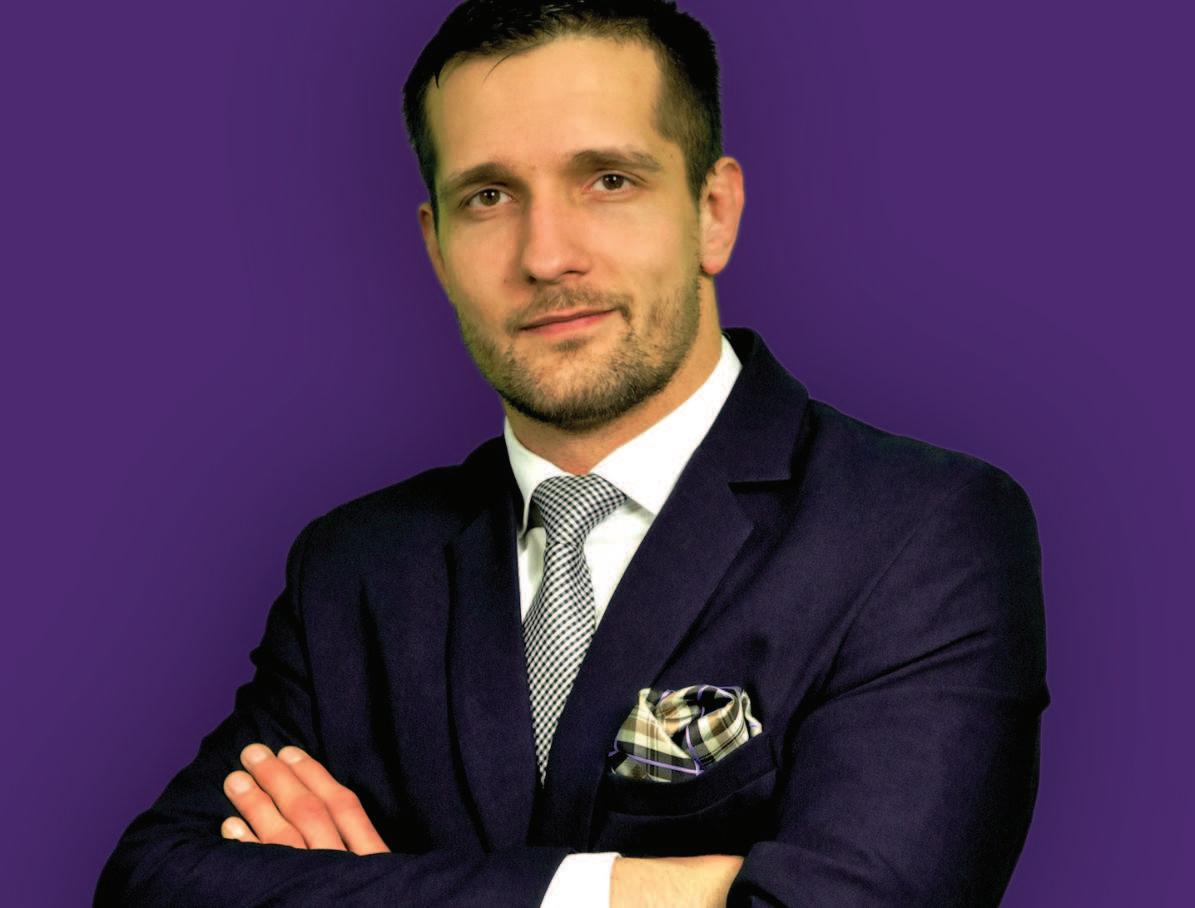
An interview with Tomasz Wisniewski, the Newly Appointed CEO and Director of Axiory Intelligence.
Axiory Intelligence is the newest market news and analysis provider to take the FX industry by storm. Launched by global 昀椀ntech company, Axiory, the news portal aims to inform and educate the next generation of traders through a seamless stream of trader-centric content.
At the helm of the project from start to launch, is expert trader Tomasz Wisniewski, who’s been appointed the CEO and Director of Axiory Intelligence. Wisniewski is not new to the Axiory group, having served as Head of Education at their dedicated broker, Axiory Global for close to a year. A savvy and successful trader himself, he’s been in the industry for over a decade, as a market analyst, trader, and a well-known educator.
Over the years, Wisniewski has taught thousands of traders through more than 400 webinars, seminars, lectures, and training courses across the globe. But for the last year, he’s been focused on expanding Axiory’s vision to help the trading community by introducing a new, independent and dedicated news and market analysis portal. His history in trading was and continues to be integral for his new role, because Axiory Intelligence was designed for traders, by traders.
“Every aspect of Axiory Intelligence was designed with the trader in mind. Topics are sectioned off and grouped for easier navigation, 昀椀lters allow every trader to monitor only news that’s relevant to their trades, we’ve included both brief overviews and lengthy in-depth market analysis and we plan to continue developing the interface based on the feedback we get from our traders and viewers” said, Wisniewski in a statement on the company’s website.
We sat down with the newly appointed CEO, to discuss his new role and why he believes there’s never been a more important time to provide traders with accurate and reliable information.
GIVE US A BIT OF BACKGROUND ON AXIORY INTELLIGENCE.
Axiory Intelligence is an independent news portal where traders and investors can access news and analysis on global 昀椀nancial markets. We provide real-time global market coverage and intelligent analysis across a wide range of 昀椀nancial assets including Currencies, Commodities, Energies, Metals, Indices, Stocks, and ETFs, as well as economic events and indicators.
Our teams of dedicated 昀椀nancial analysts watch the markets twenty hours a day, seven days a week, to deliver essential market news and insight to our traders and investors around the world.
Most importantly Axiory Intelligence was built in-line with our core values at all Axiory companies, including our dedicated broker, Axiory Global, to bring value for traders and always put them 昀椀rst. Knowledge being the most important element in trading, Axiory Intelligence caters to that need, by bringing both relative market news pieces to keep traders informed, as well as education that’ll set them in the right direction.
WHAT’S YOUR NEW ROLE AS AXIORY INTELLIGENCE’S DIRECTOR BEEN LIKE SO FAR, AND WHAT ARE YOUR FUTURE GOALS FOR THE COMPANY?
It’s been an incredible year so far, and the culmination of a long year of planning and hard work.
I’m a trader myself, and I know 昀椀rst hand how important it is to have trustworthy new sources providing accurate, realtime information on the 昀椀nancial markets. As traders, we’ve all experienced how valuable it is to have access to that kind of information.
I think the value of this information has recently increased dramatically with all the volatility in the global markets. COVID has had an unprecedented impact on our lives. We’ve noticed that it has also been a catalyst for traders to look for better, more reliable market news and information resources. In many cases, it’s also given us the time to up-level our market knowledge and skill-set through a wide variety of online training and educational resources.
I believe that Axiory Intelligence is uniquely poised to be an essential resource for traders and investors looking for education, veri昀椀ed market information, and intelligent analysis about the future. My role is to make that happen.
Our plan is to take education and support to another level by personalising the experience.
Today, there is no shortage of trading information, analysis, and educational material online.
Type ‘Traders Education’ into Google and you’ll see the overwhelming number of choices you have; videos, webinars, courses, newsletters, articles, and educational resources of all kinds. At Axiory Intelligence, we provide carefully-picked and focused news and education that’s for traders, we also offer oneon-one support and mentorship.
Our plan is to continue to grow our local analyst teams across every Axiory location. We believe that having experienced traders with empathy and knowledge, available to answer any questions a trader or investor may have, is a great way to synthesize and apply the information they learn.
Our on-the-ground analysts provide us with deep local market insights, and they are also there to provide our clients with expert one-on-one support. We’ve found this to be a more effective way of accessing market insight, as well as developing your trading skills.
As a trader myself, I know that this type of support is a keystone to becoming a better trader, and I look forward to Axiory Intelligence being a leader in providing it.
Axiory Intelligence, as an independent source of market analysis and education, is accessible to global viewers without any subscription or fees. You can head to intelligence.axiory.com and get your dose of daily content, that’ll keep you informed and upto-date so you can make better trading decisions.

Sharjah’s investment promotion arm is building on the emirate’s vision of inspiring sustainable development by identifying and facilitating opportunities for investors across various sectors
Sharjah FDI Of昀椀ce (Invest in Sharjah) is the investment promotion agency of the Emirate of Sharjah, launched by the Sharjah Investment and Development Authority (Shurooq) in 2016. Driving the continued transformation and economic diversi昀椀cation of the emirate by attracting diverse, long-term and high-yielding investments from across the world, Invest in Sharjah has done a tremendous job of ramping up national and regional FDI performance and growth.
These efforts have been hailed by reputed global institutions such as the World Association of Investment Promotion Agencies, which nominated Invest in Sharjah to assume MEnA’s regional
directorship at WAIPA for a two-year term, until 2021. The entity also made waves in the international press, with International Finance, a premium UK-based business and 昀椀nance magazine naming it the ‘Best FDI Agency 2019 – UAE’.
naturally, Mohamed Juma Al Musharrkh, CEO of Invest in Sharjah, is very upbeat about Invest in Sharjah’s prospects. He said: “Sharjah is booming with opportunities across several sectors like manufacturing and logistics, road and transport, real estate, healthcare, IT, education, publishing and R&D, that are of interest to global investors.”
“Through our strategic networking efforts and global road shows over the past four years, we have increased investor awareness about the competitive business advantages and economic bene昀椀ts investors can avail right off the bat as they enter our markets. The emirate’s robust network of free zones - home to 12,675 companies - all offer tax exemptions, full
pro昀椀t repatriation, simpli昀椀ed licensing procedures and fast-tracked business registration processes. An additional 61,200 entities registered with the Sharjah Economic Development Department (SEDD), have contributed to the overall industrial development of the UAE, generating job opportunities not just here but also in their countries of origin,” he added.
Sharjah’s vision to attract diverse and responsible FDI includes being realised by six specialised free zones, where every business belonging to almost any market sector will have an opportunity to grow not just locally, but also pursue regional expansion from Sharjah. In Sharjah Media City, enterprises in the media, creative and innovation industries, will 昀氀ourish; while in Sharjah Publishing City, a sprawling 40,000 sqm business town, publishing, printing and allied businesses will have

exclusive rights to operate. Then there is the Sharjah Healthcare City which hosts not only hospitals, clinics and wellness centres, but also healthcare-related warehousing, equipment, light assembly plants, and retail and accommodation facilities across 2.4 million square-metres; and Sharjah Research, Technology and Innovation Park (STRIP), a unique meeting point for government, industry and academia mandated to manage Sharjah’s innovation and R&D ecosystem.
These relatively new free zones complement the Hamriyah Free Zone and Sharjah Airport International Free Zone, established in 1995 with a focus on industry.
Since Invest in Sharjah announced the launch of the Sharjah Investors Services Centre (Saeed) last november. This one-window consultative and business licencing service has already bene昀椀ted 1,500 clients, mostly in real estate and e-commerce.
The single-window facility offers every service a new-comer in the UAE market requires – all in 60 minutes. From attestation of commercial and residential tenancy contracts; membership registration at Sharjah Chamber of Commerce and Industry (SCCI); facilitation
of utility services as well as payment of bills; to issuance and renewal of commercial licenses, entry permits. Additionally, all services under the Federal Authority for Identity & Citizenship; issuing and renewal of all types of trade licenses; legal and tax consultancy services, including maintenance of records related to tax transactions and preparing and submitting VAT returns are also on offer under one roof at Saeed.
Sharjah has made it a strategic goal to build an innovative, inclusive and resilient economy by attracting foreign investments that promote the emirate’s green growth principles, which aim to raise standards of living while ensuring environmental sustainability.
Projects like the US $544m Sharjah Sustainable City, the emirate’s 昀椀rstever net zero energy mega project in partnership with Diamond Developers have opened brand new FDI avenues, and re昀氀ects Sharjah’s commitment to the establishment of worldclass infrastructure that promotes environment-friendly and sustainable living.
Sustainable tourism is another key element of Sharjah’s diversi昀椀cation programme, with the Sharjah Commerce and Tourism Development Authority’s
Vision 2021 initiative aiming to attract 10 million visitors by 2021. The strategy, launched in 2015, seeks to build the emirate into a top regional destination for family tourism by investing in a range of ecotourism and cultural attractions.
The initiative has contributed to a rise in both public and private investment in the sector with a portfolio of completed and ongoing projects worth US $ 2.06 billion. Sharjah aims to achieve the perfect harmony between luxury and culture in developing current and upcoming cultural and eco-tourism projects which offer unique investment opportunities.
“Sharjah’s economic programme is focused on developing into a vibrantly diversi昀椀ed ‘knowledge economy’,” said Mr Al Musharrkh. “We have been investing consistently in education, research, and healthcare sectors to boost local human capital and offer the kind of infrastructure international businesses will need to continue developing in the long term. Sharjah’s comprehensive strategy is also opening out new and emerging markets such as ecotourism or net zero energy communities as viable options for investors. In short, we have what it takes, and would like to reiterate, Sharjah is open for business!,” he added.
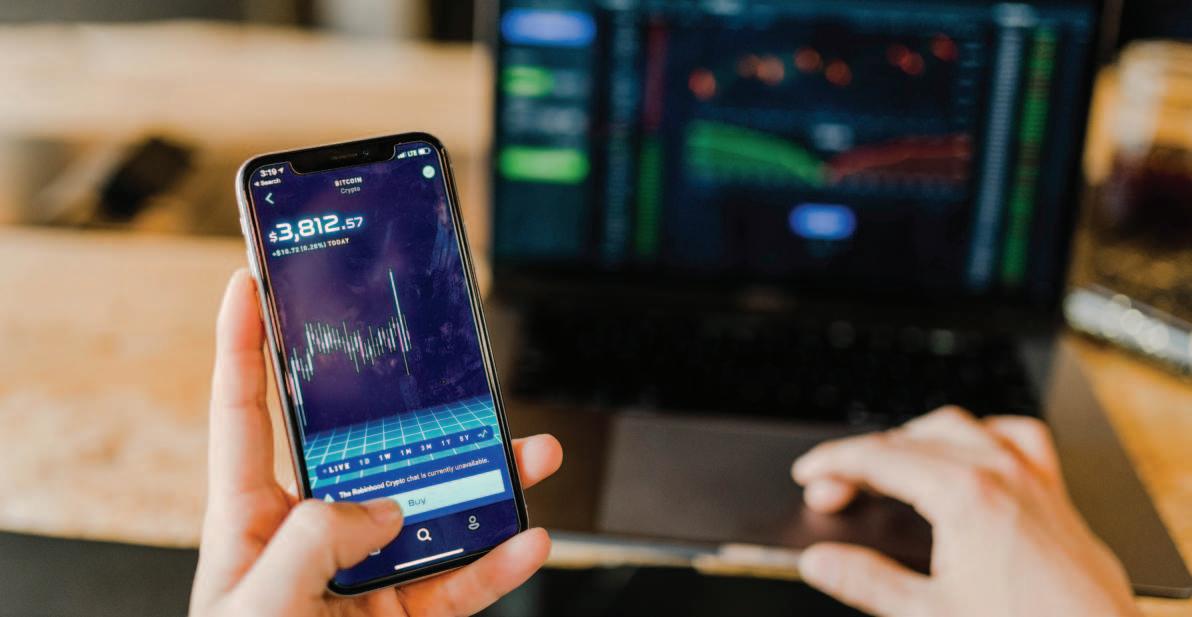
By Lean Fisher, AudaCity Capital PR
As the trading industry changes; traders are becoming more and more skilled. However, they are facing the problem of being under-capitalised as they are emerging from retail backgrounds instead of traditional university and banking routes. With the COVID-19 pandemic, trading has become – for some – a skill or hobby to earn extra money, but for others – trading is the beginning of a new career.
Previously, it was dif昀椀cult to participate in the trading and FX market due to the high transaction costs and governments were strict on keeping control of exchanges. This was until CFTC (Commodity Futures Trading Commission) passing two important bills that opened doors for the trading industry. The Commodity Exchange Act and Commodity Futures Modernisation Act allowed traders to take advantage of the new, densely populated FX industry.
However, traders still faced one major problem: being undercapitalised. Traders lacked the funds they needed to trade successfully and achieve maximum success in the industry. Even today, economic uncertainty means the market is becoming more and more sparse due to this issue.
This is where AudaCity Capital steps in. AudaCity Capital, a world-renowned trading 昀椀rm for backing and funding pro昀椀table traders, has changed the way traders are able to achieve success and funding. Founded in 2012 in London, the company has over 500 traders in over 40 countries, providing them with capital and a platform to begin showcasing their talent as traders and drawing out the new, retail-based, era of the FX industry.
The company began just a few years after the recession of 2008. With many Proptrading Firms closing; AudaCity Capital went against the trend as they were determined to keep the industry alive.
“The idea behind AudaCity Capital and the service we wanted to o昀昀er was something I needed personally” states Karim Yous昀椀, CEO and Chief Global Strategist.
He struggled to raise capital for himself, a problem for a lot of traders in the industry and decided to change this with AudaCity Capital.
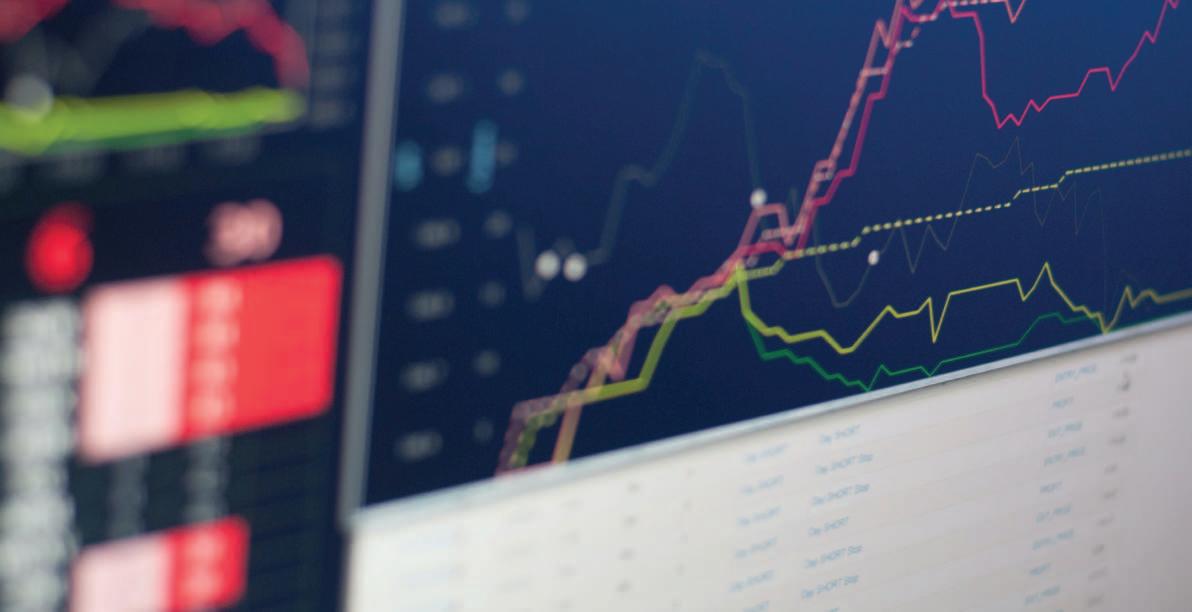
“I truly believe that the next generation of superstars in this 昀椀eld will come from the retail environment”, he adds.
He pushes for the industry to begin to populate, especially in London city. He continues by saying “we invest in people. We are looking for like-minded, talented individuals, seeking to grow their skills and enhance our trading performance with our proven team of professionals.”
AudaCity Capital then created the Funded Trader Program to combat the issues of raising capital in the trading industry and to populate the industry once again. The Funded Trader Program is designed for experienced traders who lack funding to be able to reach their full potential. If you apply, you’ll need to go through an interview process in which a member of AudaCity Capital’s team will assess your skills and experience on an individual basis.
If accepted onto the program, AudaCity Capital provides you with a starting account of $15,000 of company funds for you to begin trading the FX market. They do not use a retail broker, instead, using an institutional liquidity provider that allows the trader to bene昀椀t from deep liquidity in the market with no commissions or swaps on trades and tight spreads.
The Funded Trader Program is highlighting a new way of trading that is becoming increasingly more popular, with many other companies following in AudaCity Capital’s footsteps. Their website features daily interviews with their traders who share their journey into the industry and the bene昀椀t of trading with funding.
If you are a successful trader with a proven trading strategy who is looking to move to the next level, then AudaCity Capital can provide you with a range of bene昀椀ts with their exceptional program.
If you have little to no experience in trading or the FX industry, AudaCity Capital also offers a training program named The Hidden Talents Program, which provides intensive training to provide you with the skills to become a successful trader. You do not need any experience or academic quali昀椀cations to join the Hidden Talents Program. They accept people purely based on natural intellect and the psychology needed to be a pro昀椀table trader.
The Hidden Talents program provides new opportunities to people all over the world. The program allows trainees to change their lives and form their career path, providing new blood in the pool of FX traders. AudaCity Capital is helping shape the new generation of traders by valuing their traders, new or experienced, to achieve their full potential and become successful.
Both the Funded Trader Program and the Hidden Talents Program provide the city of London with opportunity to grow within the trading and FX industry. As more people begin to work remotely in the midst of COVID-19, AudaCity Capital provides a unique opportunity to advance your career or begin a new journey.
The future vision of the company is to bring even more traders into the industry, from all over the world and from every background, to populate an industry that was once suffering.
More details can be found at: www.audacitycapital.co.uk
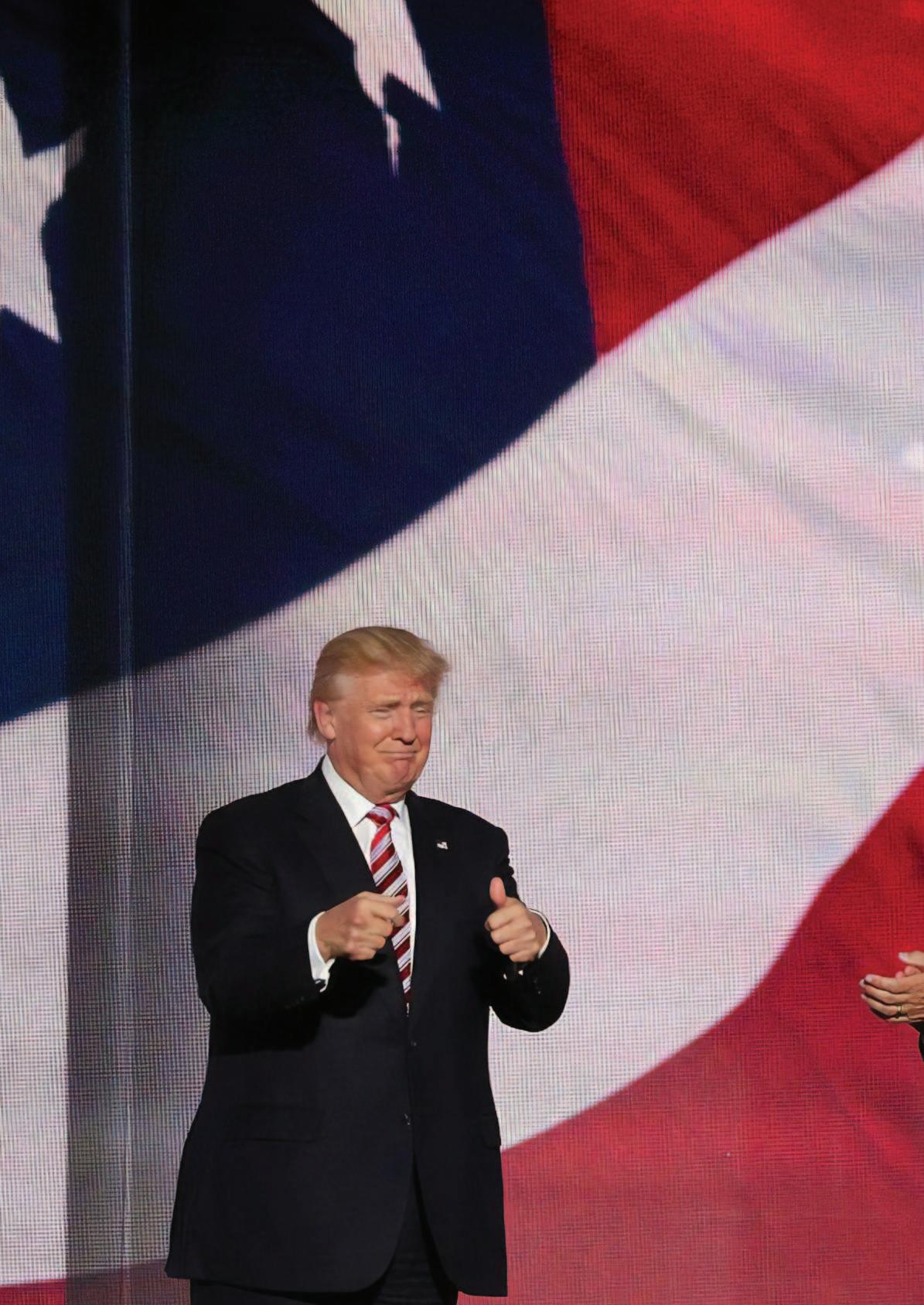
By Jason Ward, freelance writer
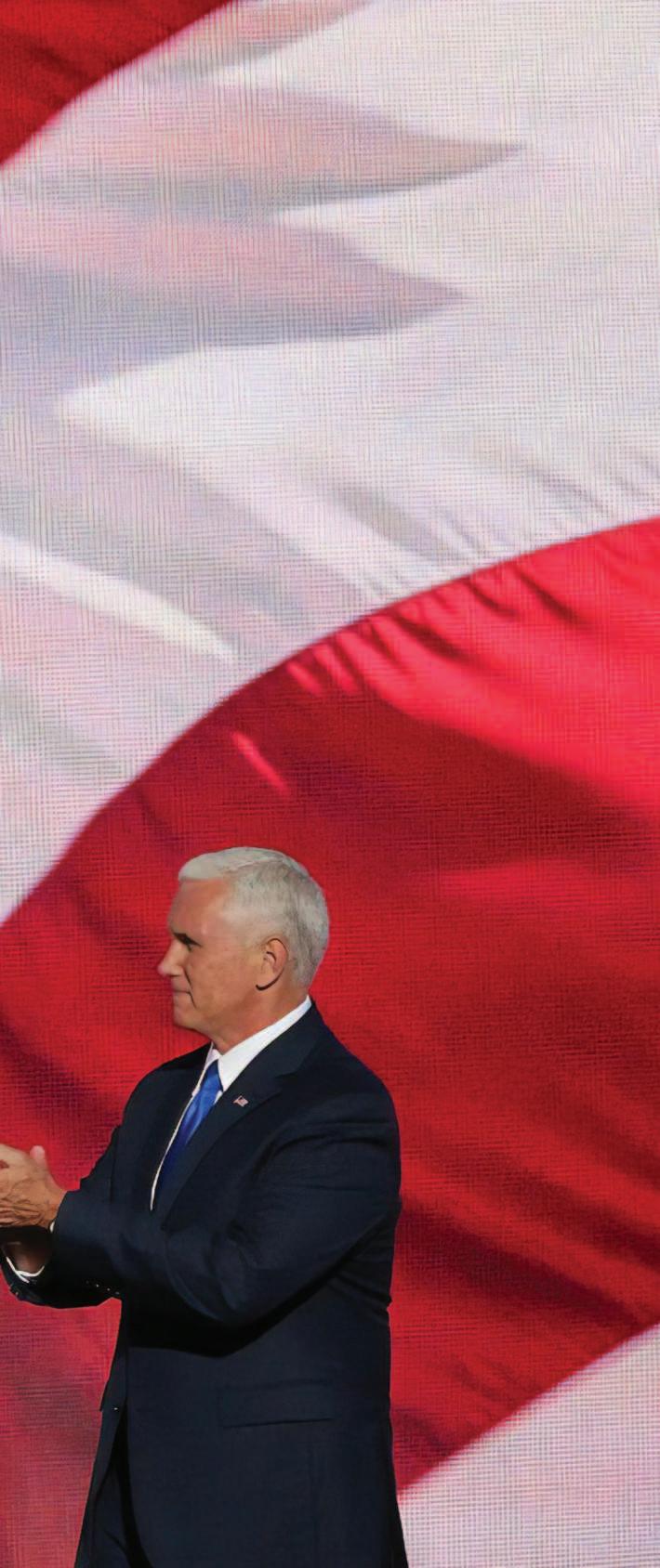
In the 2016 United States presidential election around a quarter of votes cast were done by post. In 2020 that number is expected to be a lot higher due to health concerns relating to the coronavirus.
However, President Donald Trump has publicly criticised plans to expand postal voting saying: “Mail-in ballots are very dangerous – there’s tremendous fraud involved”. This accusation subsequently prompted Ellen Weintraub, commissioner of the Federal Election Commission, to state: “There’s simply no basis for the conspiracy theory that voting by mail causes fraud.”
not everyone can vote by post and the rules vary from state to state. Some, such as Hawaii, Utah, California, Oregon and Washington automatically send out postal ballots to all voters. Additionally, about half of the states allow postal voting on request. The remainder require a valid reason such as illness, being over 65, or being away from the state where the voter is registered.
There have been cases of fraud but they are rare. For example, the 2018 primary in north Carolina had to be re-run when it was discovered that a Republican consultant had tampered with the ballots. Another case earlier this year involved two Democratic councillors who were caught and charged with fraud after having stuffed hundreds of ballots in a post box. But these are largely isolated cases and voting fraud is not common.
In fact, a study in 2017 by the Brennan Center for Justice found that fraud during US elections overall was between 0.00004% - 0.0009%. When it comes to postal fraud the 昀椀gures are incredibly low. A database of voter fraud compiled by Arizona State University showed that between 2000 and 2012 there were only 491 cases of postal ballot fraud from hundreds of millions of votes. A review by the Washington Post of postal votes in the 2016 election revealed just one proven case of fraud. The state of Oregon is one of those that holds postal elections and since 2000 has only found 14 cases of fraud.


To prevent postal voting problems authorities have various checks in place, such as checking and comparing signatures and ensuring that the post comes from voters’ registered addresses.
Even members of Trump’s own Republican party are disagreeing with the president. In August this year, in an interview with the Sutherland Institute, Senator Mitt Romney said: “I don’t know of any evidence that voting by mail would increase voter fraud.”
President Trump has repeatedly claimed that illegal voting lost him the 2016 popular vote. In July this year, he tweeted: “Mail-In Voting, unless changed by the courts, will lead to the most CORRUPT ELECTIOn in our nation’s History!” It is argued that postal voting bene昀椀ts Democrats over Republicans but this seems more due to voter preference than fraud.
A study by Pew Research found that in the states where all votes are done by mail, 89% of Biden supporters preferred voting this way compared to 43% of Trump supporters. The research also revealed that 68% of Trump voters who describe themselves as “very conservative” prefer to vote in person with just 11% preferring to vote by mail.
Adding further fuel to the debate is Trump’s opposition to the United States Postal Service (USPS). As he believes mail-in voting is likely to increase fraud and bene昀椀t the Democrats, he has tried to actively restrict Americans from voting by mail.
In June 2020, the president installed Louis DeJoy, a Republican donor, as Postmaster General. Almost immediately, Dejoy banned overtime, stopped extra trips to deliver mail on time and restructured upper management by removing or reassigning over two dozen top of昀椀cials. He also took of昀氀ine 671 high-capacity letter-sorting machines. Postal services were delayed across the country almost immediately. While DeJoy defended
the plans as being done for improved ef昀椀ciency he has since put the plans on pause. Even so, some cities have reported service cuts.
In August, House of Representatives speaker, nancy Pelosi, and House Democrats grew alarmed when the post of昀椀ce reported that it might not be able to cope with the increased number of postal ballots. Pelosi recalled the Democratcontrolled House from recess and passed a $25 billion package to help USPS. In response to the postal service controversy, Trump tweeted that it was a “hoax” and the money wasn’t needed. He urged Republican lawmakers to reject the bill but more than two dozen refused and it passed by 257-150.
Hopefully not. Even if there are delays to postal voting it is unlikely to be enough to overcome Biden’s lead, according to polls. In the lead-up to the election; Biden is riding high in the polls. Pew Research Center has him 10 points ahead at 52-42, while Ipsos calculates a 12 point lead of 53-41.
The new York Times adjusted these 昀椀gures to see what the result would be if the polls were as inaccurate as in the 2016 election and even then Biden was 7 points up. In comparison to 2016, Hillary Clinton was polling with just a four-point lead and she still won the popular vote.
Due to the virus, more people than ever are predicted to vote earlier in person, easing some of the pressure. Additionally, due to the postal voting controversy, there is increased awareness of the need to get the ballot in quickly.
Both Republicans and Democrats want a fair election and while the postal voting has been controversial, the issue has originated more from the president than his party. Biden is currently set to win but in this unique and fascinating election, nothing is certain.

The COVID-19 pandemic and economic lockdowns have severely affected the global economy. Countries put in place lockdown measures to curb the spread of coronavirus, but they negatively impacted the economy and worsened businesses and their 昀椀nancial positions. Unemployment rates increased with consequent signi昀椀cant income loss for households as companies took measures to lower their costs.
Particularly, the SMEs are more vulnerable and already on the verge of collapse.
They account for 90% of all enterprises globally and generate more than 50% of employment. Their downturn means widespread loss of output and hiked unemployment.
There’s an urgent need to explore all possible options to mitigate the coronavirus outbreak’s impact and revive economies beyond the pandemic under such dire circumstances.
According to analysts at S&P Global Ratings; social instruments can directly support households by compensating them for lost income and provide access to affordable services such as healthcare and education.
Additionally, most governments have introduced various policies and massive stimulus programmes to cushion households and businesses from COVID-19 impacts.
The Un Secretary-General called for solidarity outlining three components; health emergency, social impact in response and recovery, and helping countries recover more sustainably for the long-term.
COVID-19 UnDP’s Integrated Response also supports and guides countries to prepare, respond, and recover. Its immediate priorities include health systems support, integrated crisis management and response, social and economic impact needs assessment, and response.
Islamic 昀椀nance can help countries to navigate economic turbulence caused by the COVID-19 pandemic.
They abide by the objectives and goals of Sharia (Maqasid). Even though interpretations of the Maqasid differ, they broadly revolve around the protection of life, faith, mind, wealth, and dignity.
Islamic 昀椀nance also overlaps with Environmental, Social, and Governance (ESG) principles and the broader aim of sustainable 昀椀nance.
That said, the Islamic 昀椀nance industry has been considering the potential to use their social instruments to address the impact of COVID-19 on banks and corporates.
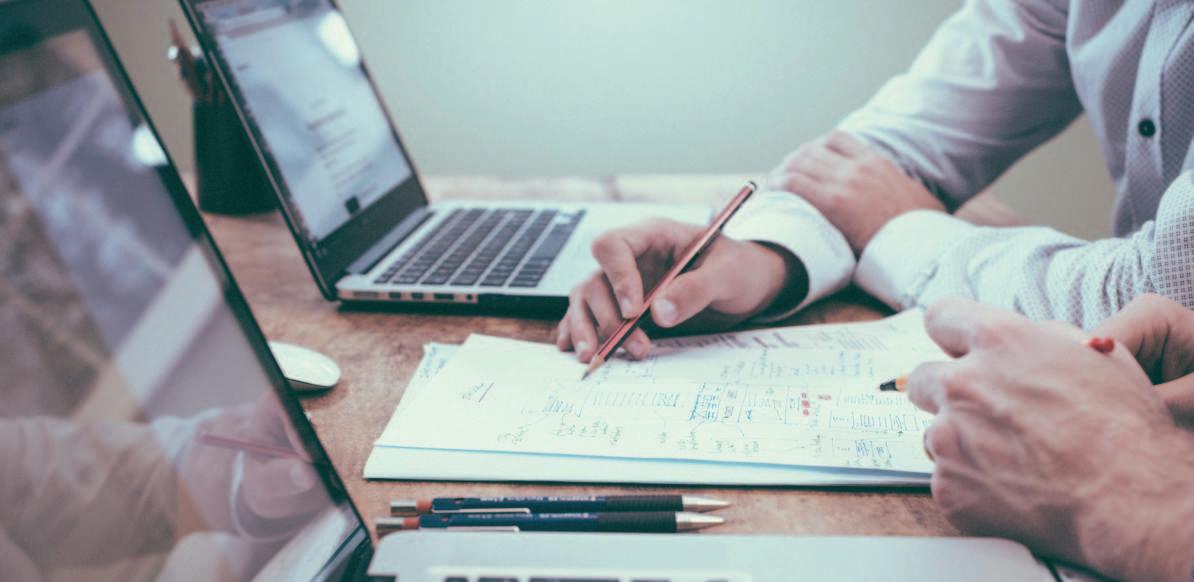
Such considerations include unremunerated or subsidised liquidity to help banks and corporates cope with short-term revenue loss and allow them to preserve employment.
Islamic banks consider a more lenient approach concerning their potential headcount reduction unless the crisis deepens further.
Several conventional banks retained staff and used other measures, such as paid leave with or without a reduced salary, or remote working arrangements.
Stakeholders in Islamic banks could perceive major layoffs negatively, and such moves would probably also 昀椀nd opposition from their governance structures, including Sharia boards.
Also, its orientation towards supporting SMEs will have a crucial role in tackling the effects of COVID-19.
HOW ISLAMIC FINANCE CAN CONTRIBUTE TO THE COVID-19 RESPONSE
Islamic 昀椀nance can help tackle COVID-19 in a range of 昀椀nancing instruments well-suited for each stage.
a) Zakat
Zakat is a term in Islamic 昀椀nance that refers to a mandatory obligation for every Muslim to donate a certain portion of wealth every year to charitable causes.
While it’s a form of worship, it’s also vital in the national and nGO emergency support programs.
Zakat donors require it to be disbursed within one year of their donation to support the poor and those economically insecurean area of increased need during the pandemic.
Zakat supports people in need or has lost a portion of their income without expecting repayment or remuneration. The focus on immediate bene昀椀t makes Zakat suitable for crisis response and helps compensate households’ income loss because of COVID-19.
Charitable donations are a comprehensive tool that can support healthcare, food, and other immediate needs.
Businesses can contribute money, goods, and expertise through corporate philanthropy.
The United nations Development Programme (UnDP) partnered with Badan Amil Zakat nasional (BAZnAS) to help Zakat stakeholders systematically link their projects with Sustainable Development Goals (SDG), including response to a crisis. BAZnAS is a Zakat collection agency established in 2017 in Indonesia.
In 2019, UnDP launched a partnership with the World Zakat Forum to lay the groundwork for members to work with UnDP and SDG alignment globally.
Recently, UnDP also partnered with the Dubai Islamic Economic Development Center to re昀氀ect on how UNDP can support the private-sector companies’ social impact.
UNDP has tools and frameworks by which 昀椀rms can align their business activities and corporate giving with speci昀椀c SDGs.
Qard Hassan is a form of interest-free loan. It’s granted for welfare purposes or to bridge short-term funding requirements.
As individuals and corporations grapple with the impact of COVID-19 on their revenue, Qard Hassan from banks could provide breathing space until they stabilise. For example, central banks of some of The Gulf Cooperation Council (GCC) countries opened liquidity lines for 昀椀nancial institutions at no cost. They provide subsidized lending to their corporate and SME clients.
2. MEDIUM-TERM RESPONSE
Aligning SDGs and Islamic 昀椀nancial activities is a signi昀椀cant opportunity for Islamic banks.
a) Equipment, vehicles, and trade 昀椀nance
Islamic 昀椀nance can support recovery through 昀椀nancing equipment, vehicles, and trade 昀椀nance.
For example, in 2018, the AI Baraka Banking Group collaborated with the UNDP to align over $600 million of its 昀椀nancing portfolio with SDGs in Africa, Asia, Middle East, and Europe. The COVID-19 pandemic makes such initiatives more urgent.
b) Impact investing
Private investment prioritising social impact businesses can play a central role in post-COVID-19 recovery.
In 2015, the UnDP’s Global Islamic Finance and Impact Investing Platform partnered with the Islamic Development Bank Group to bring global impact investing expertise to Islamic 昀椀nance.
c) Social Sukuk
Social Sukuk is a 昀椀nancial instrument where the return rate declines if the issuer ful昀椀ls particular social objectives. For example, in 2015-2017, Khazanah nasional Berhad issued the Sukuk Ihsan and successfully raised RM100 million ($24 million).
Proceeds from the fund built at least 20 schools and improved accessibility of quality education in Malaysian Government schools through a public-private partnership with the Ministry of Education.
As of June 2017, the programme had rolled out over 83 schools across 10 states, creating better outcomes for over 65,000 young Malaysians.
Such instruments can support the healthcare and education system during the current crisis. They could also attract social impact investors or Islamic investors looking for Sharia-compliant investments.
a) Bond equivalents or SDG aligned Sukuk Bond equivalents or SDG aligned Sukuk can also provide longterm capital for governments and companies engaged in the COVID-19 response and recovery.
For example, in 2018, UnDP supported the government’s Green Sukuk in Indonesia, including a $1.25 billion issuance. This is a prime example of how issuers can partner with UnDP to identify, track, and report on their SDG impact.
Through its Green Sukuk Initiative, UnDP has held workshops and other outreach programmes with partners in Pakistan, Malaysia, and beyond.
The pandemic has made long-term funding for development more critical, and UnDP is ready to help.
b) Waqf endowments
Waqf consists of donations of an asset or cash for religious or charitable purposes with no repayment intention.
In current circumstances, Waqf can provide affordable housing solutions, access to education, and healthcare for people that might have lost their income due to COVID-19.
Waqf endowments can contribute to long-term resilience. Financial and non-昀椀nancial assets such as buildings and land are permanently dedicated to social purposes.
It allows stakeholders to contribute to the social infrastructure that serves the SDGs and helps countries recover better in the long-term.
Recently, the UnDP partnered with Islamic Corporation for the Development of the private sector to look at how Waqf can potentially provide sustainable 昀椀nancing towards the vulnerable Saudi communities.
It’s time to tackle the social and economic devastation of COVID-19 and invest in sustainable development. Adopting some elements of Islamic 昀椀nance could remedy some of the economic impact of the coronavirus pandemic. UnDP is ready to help countries and communities unlock such vital partnerships and instruments to respond to the pandemic.




Bybit has bagged the award for Best Trading Platform Provider 2020. International Investor has been 昀椀nding out the success story behind this young company.
Q. TELL US A BIT ABOUT BYBITWHAT MAKES IT DIFFERENT TO OTHER TRADING ORGANISATIONS?
Established in March 2018, Bybit is one of the fastest growing cryptocurrency derivatives exchanges, with more than a million registered users. The products traded on our platform are mainly perpetual contracts, an innovative cryptocurrency futures market product. Built on customer-centric values, we endeavour to provide a professional, smart, intuitive and innovative trading experience to better serve our customers in a timely manner. We are committed to creating a fair, transparent and ef昀椀cient trading environment, and offer 24/7 multilingual support as part of our service.
Q. CONGRATULATIONS ON YOUR AWARD - WHAT DO YOU THINK MAKES BYBIT THE BEST TRADING PLATFORM PROVIDER?
At Bybit, we constantly listen, care, and improve. We aim to continue revolutionising the industry by fusing the best of cryptocurrency and traditional 昀椀nance. Our innovative, highly advanced, user-friendly platform has been designed from the ground-up using best-in-class infrastructure to provide our users with the industry’s safest, fastest, fairest and most transparent trading experience.
We believe transparency is key, especially in the crypto space where there is a whole host of uncertainty and potential risks. To us, putting the customers at the centre also means keeping them in the loop. We strive to help them stay informed with relevant information and make educated trading decisions. Trust goes both ways, and is built through transparency.
Going hand-in-hand with our dedication to transparency is our commitment to security. We believe investing in security should be one of the highest priorities on an exchange platform’s agenda, especially if it operates online. The extent of security investment re昀氀ects the overall security commitment and capabilities of a company. On average, most of the leading
cryptocurrency exchanges spend around 15% of their budget on security, while we allocate between 20% and 25% to security and have plans to raise the level to 30%. In addition, we also make an express effort to adopt and adhere to best practices in cybersecurity and risk management.
Q. YOU’RE A RELATIVELY NEW COMPANY - HOW HAVE YOU ESTABLISHED YOURSELF AS A GLOBAL CONTENDER IN SUCH A SHORT TIME?
Though it may at 昀椀rst sound counterintuitive, we actually attribute our fast growth to the fact that we have taken a patient approach and been shoring up our fundamentals and building for the long haul. Since day one, we have been determined to deliver the best trading experience and most reliable service possible: Our smart trading system leaves room for 昀椀nesse and rewards strategy; our best-in-class market depth minimises price slippage; our state-ofthe-art dual-pricing system makes the trading experience fair and transparent by preempting market manipulation with external price data; we store crypto assets in our industry-leading, multi-signature,

hierarchically deterministic cold wallet to ensure their safety; our lightning fast matching engine precludes overloads, while our powerful API refreshes market updates every 20 milliseconds to provision for high-frequency trading. All these are combined with a 99.99% system functionality all year long and round-theclock, multilingual customer support.
Q. IT’S BEEN A CHALLENGING ECONOMIC CLIMATE THIS YEAR WITH THE CORONAVIRUS PANDEMIC - HOW HAS BYBIT WEATHERED THE STORM?
COVID-19 has compelled many to reexamine their assumptions of risk and diversi昀椀cation. At the same time, major cryptocurrencies have not only stood the test of time, but passed it with 昀氀ying colours. As the gap between Wall Street and Main Street widens, more and more people are turning towards crypto for answers such as Schrödinger’s cat-esque prospects of in昀氀ation (in the case of continual stimulus packages) and stock market crash (in the case of a halt in stimulus packages) loom.
We have witnessed a number of astounding stats this year: Daily active Bitcoin addresses saw a 1671% growth between January and September; MicroStrategy’s (MSTR), a leading U.S.listed business intelligence company, allocated $400+ million in Bitcoin as its reserve holdings; the market cap for Decentralized Finance (DeFi), a hot crypto
trend that took off since June, has reached $16 billion; cryptocurrency spot trading volume in September eclipsed $676.6 billion, while cryptocurrency derivatives volume during the same period reached $634.9 billion.
Our own platform has also experienced tremendous growth in trading volumes as well as monthly active traders, and posted record highs in open interest.
Q. WHERE DO YOU SEE BYBIT IN FIVE YEARS’ TIME?
“There are weeks where decades happen” — the value in crypto’s relative insulation from the rest of the commodity markets has become exceedingly apparent in our strange time. It is becoming increasingly untenable to dismiss crypto as the realm of rogue mavericks, or vilify it as a haven for scam and criminality. The future of mass adoption is inevitable. We need responsible actors, the proverbial “adult in the room” to help guide its healthy growth. As a team of 昀椀nancial technologists and commodity traders, it is our hope that we can be a bridge between the old and the new, and take what we learned from the 昀椀nance world to help build the guardrails in the crypto world. If our efforts are successful, in 昀椀ve years crypto trading will be as easy as using TikTok for retail traders, and as reliable as trading other commodities in the eyes of institutional investors.



Esri, the global leader in location intelligence, has announced a joint initiative with AfroChampions, a Pan-African nonpro昀椀t that aims to promote policies that foster private-public collaboration for Africa’s economic transformation. The goal of the initiative is to engage leaders in business, governments, the African Union, and other regional economic communities through dialogue and potential partnership building in applying geospatial technology and solutions.
This new partnership with AfroChampions seeks to contribute to sustainable economic development in Africa and promote the bene昀椀ts of a shared geospatial infrastructure throughout the continent.
As a majority of Africans still live in rural areas, geographic information system (GIS) technology can create new opportunities for growth, especially in critical 昀椀elds such as health and telemedicine, land management, agriculture, and mobility.

The powerful mapping and data analytics that GIS provides forms a foundation for some of the most successful economic strategies that nations pursue today. This initiative will offer African governments and other organisations streamlined access to Esri’s world-leading GIS technology and expertise, in addition to a broad network of regional partners.
“Given the impact of the COVID-19 pandemic and related crises, African leaders must fast-track the African Continental Free Trade Area [AfCFTA], which is our own recovery plan,” said Dr. Edem Adzogenu, Executive Director of AfroChampions. “However, we need technologies, such as geospatial solutions, to operationalise the AfCFTA.”
Over the long term, Esri’s solutions will advance projects retained as part of AfroChampions’ Trillion Dollar Investment Framework, a 360-degree roadmap that has been of昀椀cially endorsed by the African Union and in which core enablers of the AfCFTA are transportation and connectivity.
“At a time of economic uncertainty, we consider it part of our company’s mission to coordinate and collaborate with partners like AfroChampions for initiatives that promote sustainable global development,” said Sohail Elabd, General Manager of Esri Middle East and Africa. “With the help of a network of actionoriented business and political leaders spreading across the entire continent, these initiatives can be instrumental in advancing the use of geospatial solutions for the public good around the world, from healthcare coverage to infrastructure support.”
This partnership is part of Esri’s ongoing commitment to its users and the broader geospatial community across Africa. It is closely aligned with key continental initiatives such as AfCFTA; the African Development Bank Strategy for 2013–2022; the United nations 2030 Agenda for Sustainable Development; and the African Union Agenda 2063, which emphasises the need for global Geospatial Information for Sustainable Development (GI4SD) management.
“Esri’s support is timely,” continued Adzogenu. “It can help us in many practical ways, like compiling data, identifying best practices that can be replicated from one country to another, de昀椀ning the right locations for strategic infrastructure projects, or launching cross-border renewable projects.”

Awardee of “Most Distinguished Wealth Management Firm of East Asia 2020”
1. HOW WOULD YOU DESCRIBE WINLAND IN A NUTSHELL?
Founded in 1970 with over 50 years of legacy in Hong Kong, Winland Wealth Management Limited started as an investment arm of a prominent local family and has evolved to a unique wealth management 昀椀rm that provides holistic 昀椀nancial solutions to wealthy investors in Hong Kong and overseas. As an originated member of the Hong Kong Stock Exchange and a licensed custodian, we carry full capability in advisory, dealing and safekeeping services. We are a 昀椀nancial institution that provides a full scope of offerings. Our strong global trading platform, vast range of investment products and exclusive investment opportunities enable us to provide professional advice on wealth management matters and rare investment opportunities in the market. Along with our team of seasoned and professional wealth management practitioners, we are proud to serve our clients with an exceptional and well-rounded wealth management experience.
2. HOW HAS THE FIRM’S BUSINESS MODEL CHANGED OVER THE YEARS?
We started as a single-family of昀椀ce equipped with a full brokerage service infrastructure serving relatives and friends. As generations grew, we evolved simultaneously. At the same time, Hong Kong has advanced to being one of the top 昀椀nancial centres of the world, changing from a homogeneous nature to a world of global exposures. With the transformation occurred in the 昀椀nancial industry, Winland has strived for becoming a dynamic wealth management service provider offering a complete and sophisticated investment platform to service private wealth clients in Hong Kong and from overseas.
3. WHAT ARE THE FIRM’S BUSINESS PRINCIPLES?
The way we do business upholds our principles of:
• Integrity - Ethical and honest in all aspects.
• Fairness - Provide unbiased advice and protect clients’ interests.
• Transparency - Clear disclosure of pricing, portfolio performance, market information, investment advice and product risk level.
• Client Centric Approach - Treat clients with respect. Value partnership and collaboration.
4. TELL US A BIT ABOUT YOURSELF.
Throughout decades of exposure in the private wealth management industry, I have gained solid experience from multi-national 昀椀nancial institutions including HSBC, Bank of America, ABn AMRO, RBS and Coutts & Co. During my tenure, I spearheaded to formulate numerous successful strategies across the areas of product innovation, system integration, branding, business expansion, portfolio management, corporate restructuring, as well as the development of an integrated platform for high net worth individuals. With a love of art and investment – prior to joining Winland; I joined Christie’s, the prestigious auction house where I acquired the knowledge of art appreciation and about the world of tangible investment. Currently, I serve as an independent consultant to 昀椀nancial institutions in Asia and was nominated by CityWire magazine as one of Asia’s “Independent Power Players in 2020”. With Winland’s unique positioning in the market of private wealth and family of昀椀ce, I am often invited as a guest speakers to numerous business conferences and 昀椀nancial forums.

5. WHAT ABOUT YOUR TEAM?
Our clients are supported by a group of professional wealth management practitioners including seasoned private bankers, investment consultants, wealth managers, lawyers and senior executives along with a highly experienced client services team.
6. CAN YOU ELABORATE ON WINLAND’S INVESTMENT CAPABILITY?
As a top-notch 昀椀nancial service provider, we have access to over 50 global exchanges and a vast range of investment and protection vehicles including:
• Stocks
• ETPs
• Index and Stock Options
• Fixed Income
• Regulated & Authorized Funds
• Hedged Funds
• Private Equity and Credit Funds
• Structured Products
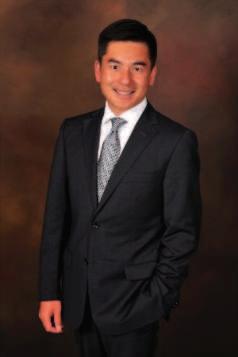
• Alternative Investments
• Digital Assets
• Fine Arts
• Life and General Insurance
• Real Estates Investments
• Ventures Capital
• Physical Commodities
• Forestry Investments
7. CAN YOU TELL US MORE ABOUT WINLAND’S UNIQUE SERVICES AND SOLUTIONS?
We are independent and unencumbered by proprietary obligations which allows us to provide unbiased, integrated, and holistic wealth management solution tailored to our clients’ 昀椀nancial objectives.
• Self-managed Account - For clients who prefer to make their own investment decisions, we offer an ef昀椀cient execution service where they have access to leading investment products and services.
• Tailored Portfolio - An investment portfolio framework is customized based on clients’ unique investment objectives and risk pro昀椀le. This service can be either advisory or discretionary.
• Family Of昀椀ce Services - We are a team of committed and experienced professionals to provide comprehensive services including private wealth management advisory, family governance, legacy planning, insurance and protection, citizenship, charity giving, budgeting and other related requests.
• Off-shore Banking - We provide direct access to off-shore banking for those clients who would like to open banking account overseas without leaving Hong Kong. They can enjoy full banking services including Lombard Lending, trading, investing, cash withdrawal and online access.
• Institutional Services - We offer strong infrastructure to support 昀椀nancial institutions in terms of effective trading platform, vast range of investment opportunities, effective 昀椀nancial vehicles, ef昀椀cient administration, and operation assistance.
8. HOW DO YOU SEE YOUR FIRM IN THE NEXT FIVE YEARS?
With unique services and comprehensive investment capabilities, we look at ourselves as a pioneer of the wealth management industry in Hong Kong. We keep innovating, evolving, and thinking beyond the conventional practice. We will continue to strive as a leader to interpret a new world of wealth management.
By Craig Pearson, CFA - CEO of Private Wealth Systems

Family of昀椀ces and ultra-high net worth individuals (UHnWI) are shocked when they learn the magnitude and consistency of data errors from custodial bank feeds, private investment manager statements, and even large, well-known investment reporting systems.
Over the past three months alone, my team and I have worked with family of昀椀ces, wherein we found that their current systems were producing signi昀椀cant errors. Errors including a total net worth for a $200 million family of昀椀ce that was incorrect by 13%, performance calculation errors that ranged from 11% to over 35% for an endowment, and errors on inception to date returns of 6.2% for a multi-family of昀椀ce. Another example that we experienced recently was with a large family of昀椀ce that invested most of their wealth in private investments held with global custodians. Unfortunately, the custodial systems didn’t update private
investment values based on cash 昀氀ows, such as capital contributions, producing major errors in total market value, allocation, liquidity, and performance.
Most people take the data they see at face value, never questioning the validity or accuracy of the data or analysis. Although research among UHnWIs shows that data accuracy is the single most important factor in 昀椀nancial relationships, most acknowledge that it’s dif昀椀cult for wealth owners to validate the data they are given. We’ve found that the root cause of performance, exposure, and liquidity errors can be broken down into three categories; bad aggregation, incorrect calculations, and poor data management.
It’s true that most investment systems and internal teams rely on aggregation platforms that simply feed data directly from bank platforms into reporting systems. However, the fact that custodial
bank feeds have an average daily error rate up to 18% means there’s a lot of bad data being fed into accounting and reporting systems that are not designed to capture and correct those errors. Assuming that a family of昀椀ce performs some reconciliation and corrects custodial errors, it is most likely that the reporting system they are using doesn’t calculate performance correctly. Most systems can’t support the computational intensity of calculating true daily time-weighted returns for public securities and rely on less accurate and more simplistic performance calculations, yet still claiming they use daily time weighted returns. Correct calculations often make a double-digit difference, which is essential when evaluating managers, strategies, and mandates, as well as complying with global investment performance standards (GIPS).

In addition, private investments have a remarkably high error rate because either the system doesn’t support the asset class well, or data management teams don’t understand the impact of incorrectly categorizing simple things like a return of capital; resulting in errors across liquidity, performance, and allocation.
Another problem is epistemological by nature: accuracy itself is ill-de昀椀ned within the 昀椀nancial industry. When asked how accuracy is measured, most family of昀椀ces focus on matching to the manager statement for private investments or custodial feeds for public investments. However, when those family of昀椀ces see the degree and frequency of major data errors from the banks and managers they begin to question their trust in data.
What’s more, the data dilemma is becoming exponentially worse as more complex investment strategies go down-market into HnW and even massaf昀氀uent markets. The answer to the data quandary is not a point solution. Rather, it is a different approach that focuses on the foundational and structural aspects of capturing, remediating, and enriching data across every type of 昀椀nancial instrument and global jurisdiction.
With market uncertainty achieving unprecedented extremes in the wake of the COVID-19 pandemic, the need for a high-dimensional wealthtech platform that can bring transparency and accuracy to private 昀椀nance has never been more vital. But, building a cloud-native wealthtech platform that can aggregate, reconcile, and enrich data from hundreds of global feeds, all while supporting every type of 昀椀nancial instrument and currency, reporting more accurately than the actual
source systems, and operating at a level of scale that can support the industry’s $31 trillion in UHnW wealth, remains the white whale of the industry.
Our industry’s main problem is that custodial bank feeds and private asset managers rely on antiquated systems that were never meant to support modern 昀椀nancial complexity. According to Deloitte’s report titled “Custodians and Depository Banks,” the vast majority of portfolio accounting and investment reporting systems are primarily iterations over core technology stacks and thought processes created in the 1980s and 1990s.

For custodians, innovation most often means “patching platforms likely implemented in the 80s” and “adding custom-built End-User Computing,” just to “keep the business going” and meet the most basic regulatory mandates, writes Deloitte. As such, these end-of-life systems were designed to simply pass custodial data onto users, requiring the user to either spot and manually 昀椀x errors themselves, or worse, negligently report bad data to their clients.
These legacy systems frequently make material reporting errors that can cause poor decision-making, regulatory violations, and investor redemptions. If reporting errors are egregious enough, some fund managers may even 昀椀nd themselves on the receiving end of a class-action lawsuit.
Highlighting rising regulatory risks for investment-reporting mistakes – look no further than the £27.6-million 昀椀ne levied by the UK’s Financial Conduct Authority (FCA) on Swiss multinational bank UBS in 2019 for some 135.8-million reporting errors it made between 2007 and 2017.
This collision of outdated legacy technology, big data proliferation, and epistemological incoherence has made data accuracy an expensive and timeconsuming operational drain for family of昀椀ces, private banks, and institutional asset managers. Solving these structural challenges is why Private Wealth Systems exist and why our system is fundamentally different than any other aggregation, investment accounting, and reporting system.
Having worked with many of the largest and most complex family of昀椀ces around the world for over two decades as well as ten of the top private banks, we have 昀椀rsthand knowledge of the systemic problems facing our industry. This experience has enabled us to build a platform that has already proven to solve the industry’s structural problems, with the modern convenience of ease-of-use and hyperpersonalised experiences.
From aggregation – where we built our own direct data feeds to the major banks and custodians around the world that support three times more transaction-level data, with the highest auto-reconciliation rates in the industry – to building the industry’s 昀椀rst logicbased transaction table, where a single operations analyst can reconcile 8.3 times more transactions compared to the industry’s legacy systems across public and private asset classes; our system is differentiated in scale and scope, solving the root causes of errors and inef昀椀ciencies. Also, since our system captures all values and 昀氀ows every day, our performance calculation is unique in exceeding Global Investment Performance Standards (GIPS), delivering true daily time-weighted returns for the best analysis and informed decision-making. Private Wealth Systems is the structural solution for the industry’s structural problems.
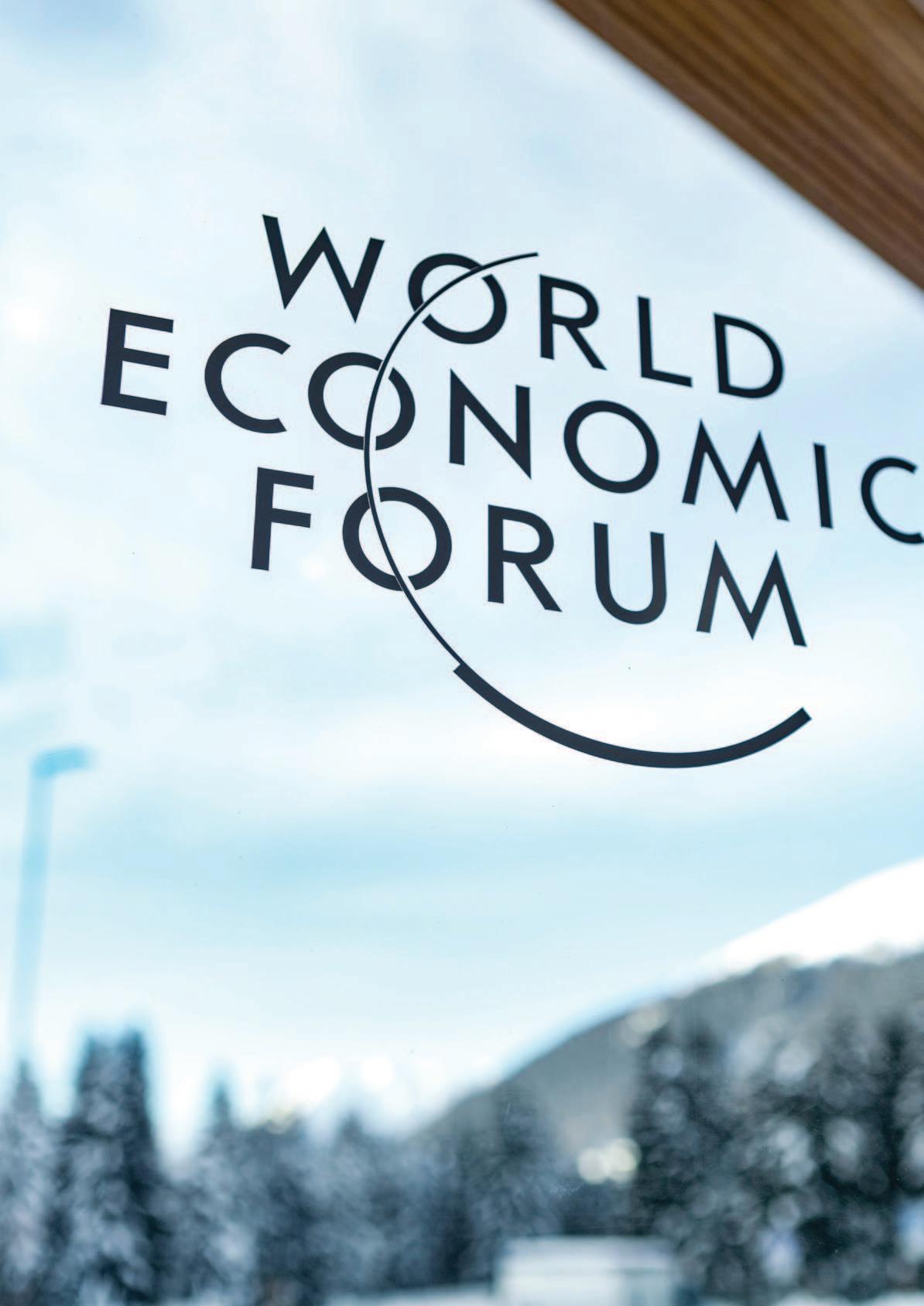
A group of government of昀椀cials and company executives from across the Middle East and north Africa (MEnA) region have backed a roadmap for inclusive, sustainable and resilient recovery from the COVID-19 pandemic, according to the World Economic Forum (WEF).
The regional decision-makers signed the Principles of Stakeholder Capitalism for MEnA, which calls for more private-public collaboration, the WEF said.
The principles were released ahead of the WEF’s Sustainable Development Impact Summit, at the end of September, aiming to scale up sustainable solutions to address the current economic, social and environmental challenges.
Signatories are members of the World Economic Forum’s Regional Action Group on the Middle East and north Africa, which WEF created earlier this year in response to the COVID-19 pandemic. The group was designed as a platform for publicprivate cooperation to showcase, scale up and replicate projects and initiatives inspired by the principles.
“The World Economic Forum’s Regional Action Group for the Middle East and North Africa re昀氀ects the engagement of the region, not only in responding to global challenges, but in proactively contributing to shaping the right vision for the future,” said Mohammed Al-Jadaan, Minister of Finance, Economy and Planning of Saudi Arabia. “The community’s vision for the Middle East and north Africa aligns with Saudi Arabia’s G20 agenda, as it aims to foster higher inclusive economic growth, harness technological advancements, enhance environmental sustainability, promote better governance and partnerships, and enhance global cooperation.”
“Adopting a shared vision and language for public-private collaboration through endorsing the Principles of Stakeholder Capitalism for the MEnA region is an opportunity to reshape our societies and economies, allowing us to emerge from the pandemic stronger, more uni昀椀ed and more resilient than before,” said Rania Al-Mashat, Minister of International Cooperation of Egypt.
The roadmap advocates the importance of public-private collaboration and includes the following action points:
• Crafting inclusive economic policies and a new social contract
• Stimulating economic integration
• Reshaping education systems
• Harnessing the Fourth Industrial Revolution
• Promoting environmental sustainability
• Mitigating global health risks
• Committing to good and agile governance
According to Abdulla Bin Touq, Minister of Economy of the United Arab Emirates, the Principles of Stakeholder Capitalism “represent the building blocks for all of us to actively work together in addressing the challenges brought by COVID-19 and to make headway on the economic prosperity of MENA.”
Meanwhile, Mirek Dusek, a member of WEF’s Executive Committee, said: “The Principles of Stakeholder Capitalism for the Middle East and north Africa constitute a milestone for the region in preparing for its future. They crucially provide a framework for promoting environmental sustainability, as they are designed to support regional decision-makers in shaping social and economic policies that are in line with the 2030 Agenda for Sustainable Development, thereby mitigating potential future climate-related disruptions and putting the region on a path of sustainable, equitable, and inclusive growth.”


there’s an infinite distance between possibility and proof







The Gulfstream G650ô and G650ERô close that gap with more than 300 deliveries and 90-plus world speed records.
the art of excellence TM


Chairperson of Mohsin Haider Darwish LLC, Areej Mohsin Darwish, has been awarded Outstanding Businesswoman of the Year. In this interview, we speak with Madam Areej about her career thus far and her thoughts on leadership.
AS A MULTI-AWARD WINNING BUSINESS LEADER AND SUCCESSFUL ENTREPRENEUR, YOU ARE SEEN BY MANY AS A ROLE MODEL. WHO WAS YOUR ROLE MODEL WHEN YOU STARTED YOUR CAREER?
Good role models empower the young generation to envision their future and the career choices they need to make to achieve their goals. I grew up in a business family and my role model was my father. He was the epitome of who I wanted to become. His relentless pursuit of excellence, determination and foresight were learning lessons. He introduced me to the business world and his guidance and mentorship gave me a good understanding of business and helped me gain invaluable real-world business experience. I learnt f rom him that there were no short cuts to success and that hard work, perseverance and determination are integral to success.
HAVING GRADUATED IN MATHS AND COMPUTER SCIENCE AT SULTAN QABOOS UNIVERSITY, YOUR FIRST ROLE WAS AT OIL AND GAS FIRM, PETROLEUM DEVELOPMENT OMAN. DID YOU FACE ANY CHALLENGES AS A WOMAN, STARTING OUT IN THIS INDUSTRY?
Women, in general, have to walk the extra mile to prove their worth in the corporate world. I am very lucky to have grown up believing there were no limits or boundaries to what I wanted to achieve in life. When I began my career, I was fortunate to be working in an environment where men and women were given equal opportunities to grow and learn. I also believe that a positive mind-set and professionalism, along with a lot of hard work, helps to overcome any struggles in a working environment.
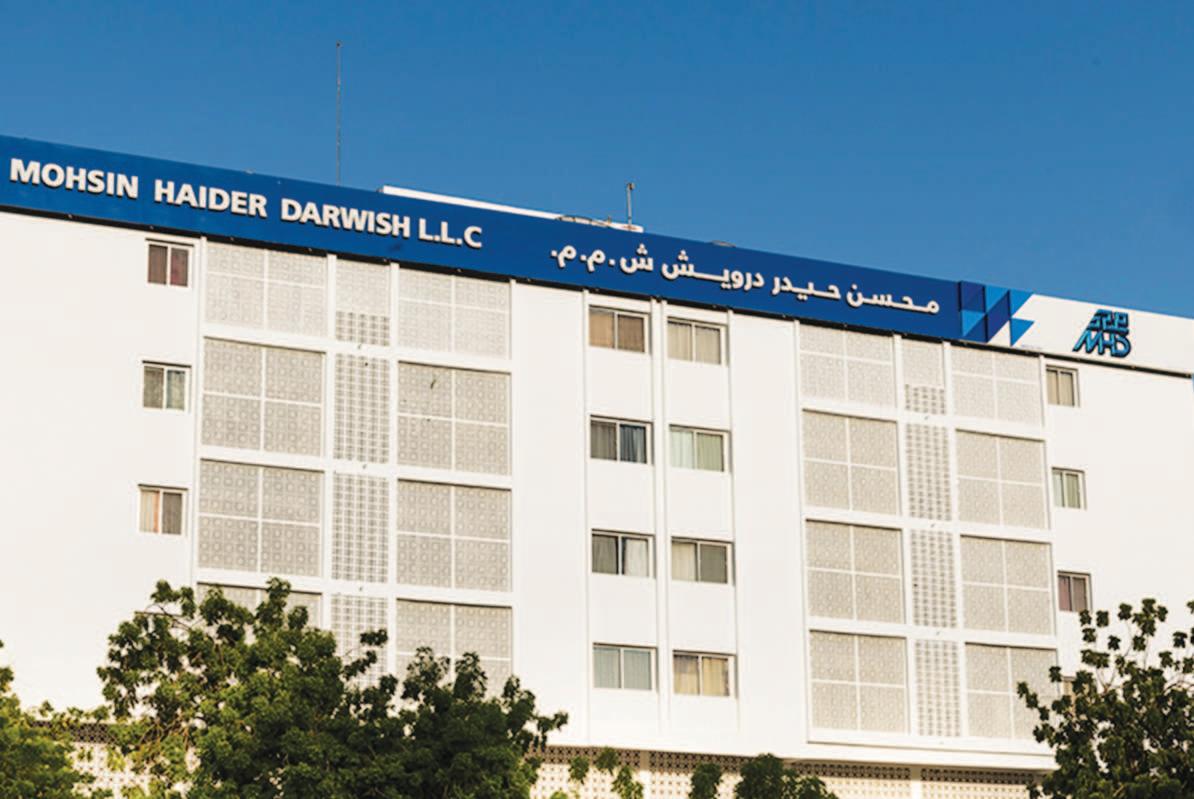
WITH YOUR WEALTH OF EXPERIENCE TODAY - IS THERE ANYTHING YOU WOULD’VE DONE DIFFERENT IN HINDSIGHT?
I believe that although it would be great to go back in time, I wouldn’t like to change anything as the decisions taken and the journey of growing our organisation gave us valuable lessons that have made us who we are. Without having gone through the business processes, we wouldn’t have gained the understanding and perspective of running a business through its complexities.
WHAT IS YOUR LEADERSHIP PHILOSOPHY?
Leadership is the ability to set the direction where the leader leads the rest of the team. I’m a believer in leading by example and I believe that a leader needs to direct the organisation in a way that makes it more coherent and cohesive. I follow a philosophy of leading with optimism and positivity. We have a positive organisational culture as we believe that a positive culture is the key to sustainable business success. We have
professionals running the various divisions and together we roll out the vision for each division and for the company as a whole. Collaborative discussion, listening and analysing the issues is the key. We listen to our employee’s ideas and opinion on various business matters as they give us additional insight into the business operations. The management provides guidance and direction to its employees and we ensure that we create the right environment for our employees to exercise their capabilities to achieve the objectives. We encourage creativity and innovation which is consistent with the goals of the organization.
IN YOUR ROLE AS CHAIRPERSON OF MHD, WHAT CHALLENGES WROUGHT BY THE GLOBAL PANDEMIC HAVE YOU HAD TO OVERCOME? HAS THIS AFFECTED YOUR CORPORATE STRATEGY?
Covid-19 has posed challenges around the world; these are unprecedented times and the impact of the pandemic has been far-reaching. However, at MHD, we have devised Business Continuity plans to address any crisis. This facilitated us
in overcoming the challenges during COVID as we identi昀椀ed the potential issues and developed an action plan. We realised the importance of networking ef昀椀ciently in the “new normal” by creating a system to address our customers’ needs. We leveraged digitalisation and technology to address some disruptions. We set up the e-commerce website for our automotive sector to stay connected with our customers. As an organisation, our primary concern during the pandemic was the safety and wellbeing of our staff. We implemented remote working arrangements and strengthened health and safety measures. Though a challenge, we remain positive and I see this pandemic as a learning experience to devise plans for the future and that it always helps to be prepared for the unexpected. The pandemic has strengthened our resilience and we have emerged more robust and agile. Our long term corporate strategy remains unchanged as we look to diversify & explore opportunities for further growth and remain focused on the bigger picture.
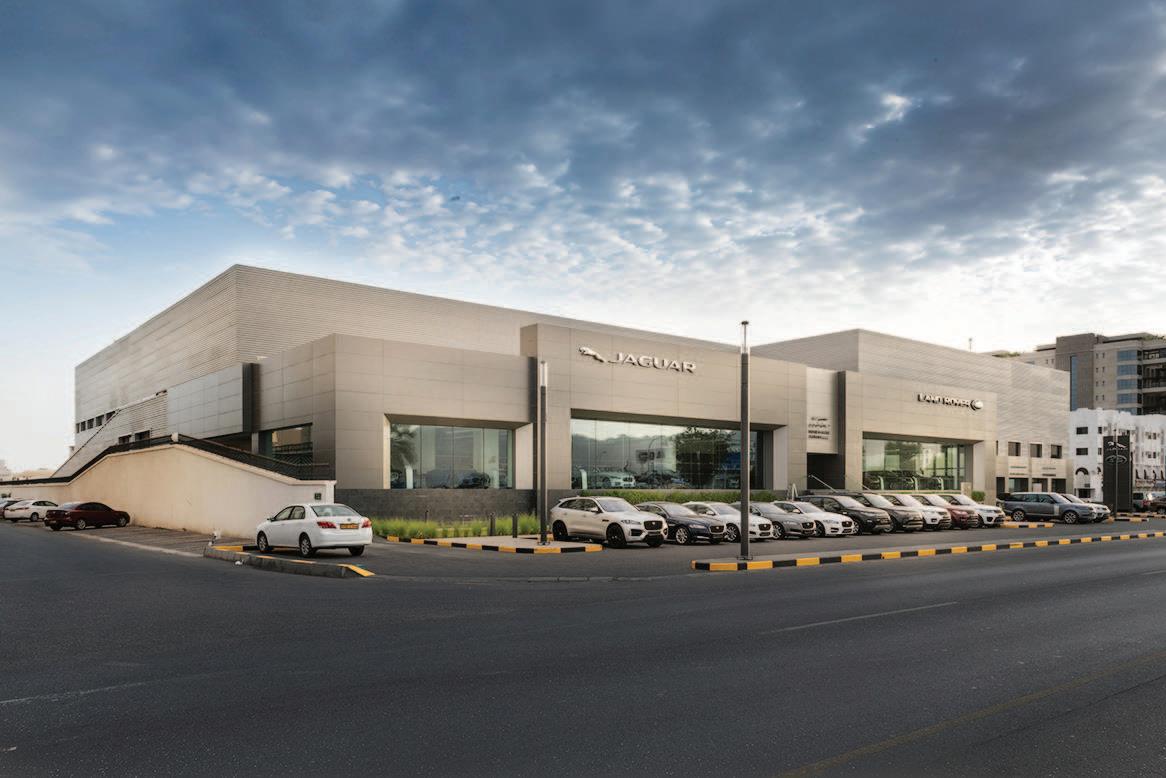
OMAN IS ATTEMPTING TO STRUCTURALLY DIVERSIFY AND STRENGTHEN ITS NON-OIL SECTORS. WHAT OPPORTUNITIES DOES THIS OPEN?
Oman’s Vision 2040 strategy seeks to catapult the Sultanate into the ranks of the world’s most ‘developed nations’ with economic diversi昀椀cation and sustainable development as key features. The 2040 vision aims to stimulate growth, build social, economic and developmental relations, focuses on innovation and knowledge, inf rastructure, logistics, education system, learning and scienti昀椀c research. The most evident advantage of diversi昀椀cation is economic development; it increases the resilience of an economy. It makes the business environment attractive to foreign investment. With new laws and regulations, the business environment is becoming more favourable for business and this will de昀椀nitely promote the Sultanate’s position as an investment destination capable of attracting foreign capital. Diversi昀椀cation also creates employment opportunities for the local workforce as they are given an opportunity to develop and realise their
full potential. More young Omanis are joining the work force and contributing to Oman’s economy which is a positive sign. It also creates an opportunity for business organisations to delve into different industry sectors and expand their product base. Oman’s geographical advantage, expanded logistics network, cultural diversity and educated talented pool are some of the factors that will steer Oman to achieve its objectives.
YOU’VE BEEN QUOTED AS SAYING “SUCCESS IN ITSELF ISN’T A DESTINATION, BUT A CONTINUOUS JOURNEY TOWARDS EXCELLENCE”. WHERE DO YOU SEE THAT JOURNEY TAKING YOU FIVE YEARS FROM NOW?
MHD LLC has achieved phenomenal progress since its inception and contributed to the growth and development of Oman. My father’s vision for the company was to embark it on the path of progress and success through expansion and diversi昀椀cation of the business divisions.
Though the future is unpredictable, it is imperative that we stay ahead of the curve. In order to stay competitive, we need to be more strategic and effective in anticipating important market changes.
An eye for detail and focused approach in the day-to-day business helps the organisation to achieve its objectives. Working towards our goal; we revisit, reinforce and refresh our strategies on a regular basis. In order to bring synergies and ef昀椀ciency in operations, we have restructured and realigned our organisation.

As a Chairperson, my vision for MHD LLC 昀椀ve years from now is to see the organisation 昀氀ourish by looking for new opportunities, strengthening relations with our business partners, expanding our footprint into new sectors by building new relationships and partnerships while continually keeping a keen eye on our 昀椀nancial performance and helping young Omanis to grow and actualise their potential. We would like to continue our quest for excellence by preparing ourselves to keep pace with the fast paced business environment and embracing opportunities that unfold in the process.
ALL OVER THE WORLD; WOMEN ARE STILL FACING GENDER INEQUALITY AT WORK. WHAT ADVICE WOULD YOU GIVE TO WOMEN STARTING THEIR CAREERS TODAY?
Women leaders and entrepreneurs are on the rise and more and more women are proving themselves in leadership positions across different sectors. It’s commendable to see women playing an active role in society, culture, and now also in business.
My advice to young women would be that they should believe in themselves and the goal in which they have set to achieve. They need to be critical thinkers and innovative. Challenges and hindrances will always be around the corner, but they should not be deterred by them. They should take advantage of all opportunities that come their way. They need to be persistent and determined to succeed in the increasingly competitive world and step outside their comfort zone and break barriers to their growth. They can have it all if they set strategic and realistic goals.
WHAT IS YOUR BUSINESS SUCCESSION PLAN CONSIDERING THAT MHD IS A FAMILY-RUN BUSINESS? IS THE NEXT GENERATION GEARED UP FOR PLAYING AN ACTIVE ROLE IN THE ORGANISATION?
A business succession plan is the key to preparing for the future and is a lengthy process. Succession planning keeps the business moving forward during the inevitable changes that come with running a business.
At MHD we realise the importance of this key feature and we prepare for all contingencies by identifying, training and preparing the next generation of leaders to move up
Since MHD is a family run business, we are grooming, developing our next generation, engaging them, and helping them get the kind of skills and capabilities that they need to manage the business in the future.
My son, Mohsin Hani Al Bahrani has recently joined the family business after completing his Masters from King’s College. He serves as CEO of ACERE (Automotive, Construction Equipment and Renewable Energy) unit of MHD LLC. He is playing an important role by rede昀椀ning the automotive operations by forging innovative partnerships and devising sales strategy to drive new streams of revenue. With a keen foresight he has been able to spot the opportunity of venturing into Renewable Energy as the world adapts to this form of energy to tackle climate change.
I am con昀椀dent that our future generation will steer MHD LLC to success. Our aim is to leave a legacy that will continue to make an impact as our responsibility to the country and its people goes beyond today and tomorrow



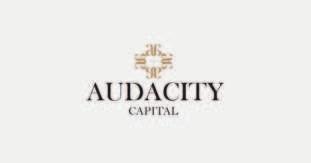

Excellence in Sustainable InvestingFrance 2020
Alter Equity supports activities and behaviours that are respectful of the long-term interests of nature and human beings while seeking attractive, marketcompetitive returns for its investors. It predominantly invests in minority stakes in European start-ups (revenue >€800k). By fostering a positive impact in business, Alter Equity’s objective is to contribute to a more sustainable society.
Alter Equity has been a pioneer in the French impact 昀椀nance industry, being the 昀椀rst fund in its domestic market targeting both social and environmental impact and inventing the concept of ESG Business Plan. Alter Equity3PII has also been the 昀椀rst French fund requiring its portfolio companies to measure their carbon footprint and grant all their staff access to stock ownership. Alter Equity currently has €150m+ under management and invested in 15+ companies.
Excellence in Trading Innovation // Excellence in Professional Training
AudaCity Capital is a prop-trading 昀椀rm based in the heart of the city of London. Founded in 2012, the company has a world-renowned reputation for backing and funding pro昀椀table traders. With 500+ traders in over 40 countries; the company provides traders with funds to trade within the FX market. As a principal trading 昀椀rm, AudaCity Capital do not have clients, nor do they provide any investment services or ancillary services to others. Their strategies are designed to use information that is publicly available, and they use fairly simple, non-controversial and transparent order types. The company is a strong supporter of fair, transparent and orderly markets. The two programs, the Funded Trader Program and the Hidden Talents Program, were created to help populate the trading industry and provide a new generation of traders.
Most Transparent Broker // Excellence in Customer ServiceAfrica 2020
The Axiory brand was established in 2012 to offer global traders a savvy, friendly, and intuitive space to access the Forex and CFD market. By putting clients’ needs 昀椀rst and localising services to best serve traders, Axiory grew into an industry leader that’s trusted by both beginners and seasoned traders from across the globe.
Trading conditions are optimized to increase success potential; from low spreads to 昀氀exible leverage, negative balance protection, full transparency, and unique risk management tools, in addition to a smart registration system which allows traders to open a live account in less than 10 minutes. With top-notch liquidity partners and techsavvy connections, Axiory ensures no third party intervention, best market prices, and minimal slippage (including positive slippage).
The broker’s strongest asset is knowing that all traders are supported and cared for by an international, highly professional, and extremely friendly team.



Most Reliable Trading PlatformGlobal 2020
Established in March 2018, Bybit is one of the fastest growing cryptocurrency derivatives exchanges, with more than a million registered users. Built on customer-centric values, the company endeavors to provide a professional, smart, intuitive and innovative trading experience to better serve customers in a timely manner. They are committed to creating a fair, transparent and ef昀椀cient trading environment, and offer 24/7 multilanguage support as part of their service.

AMR ABOL ENAIN, CEO AND MANAGING DIRECTOR OF CI ASSET MANAGEMENT
Asset Manager of the YearEgypt 2020
CI Asset Management is one of the largest asset managers in Egypt, with current AUMs of nearly EGP 10 billion. It prides itself for topping the market returns on all its managed asset classes for the past eight years with solid international recognition.
The company has a wide platform of product offerings, including 昀椀xed income, money market, equity, along with all other types of tailored discretionary portfolios. In recognition of CI Asset Management success in the Egyptian and regional markets, the company was awarded the “Best Asset Manager in Egypt” for eight consecutive years from different prestigious international organisations.
Amr Abol Enein, CEO and Managing Director of CI Asset Management commented: “These awards and international recognitions come as a result of the efforts exerted by CI Capital Asset Management’s team of professionals and the company’s ability to manage all types of portfolios and mutual funds and to introduce newly developed and diversi昀椀ed 昀椀nancial instruments in the Egyptian market with continuity and consistency of achieving the highest returns on all categories of products, outperforming the market indices and peers. We simply help our partners consistently achieve a real value add over the years.”
FINANZ KONZEPT AG
Independent Wealth Management Firm - Switzerland 2020
Finanz Konzept AG is an asset management company that offers exclusive tailored services to address the client’s speci昀椀c needs. The company employs innovative products and sustainable asset management solutions, which are characterised by concentration processes and increasing anonymity.
Finanz Konzept AG focuses on individuality, continuity, and personality and are constantly expanding their services by strengthening external partner networks and speci昀椀cally looking for employees who support their ambition as a one-stop-shop in the high-end segment and contribute to their unique working atmosphere.
As a smaller and more 昀氀exible boutique, Finanz Konzept AG has always succeeded in adapting to the market and aligning itself to its strengths. Starting with traditional and independent asset management solutions, the company has developed into an innovative multifamily of昀椀ce and covers the following business divisions: Asset Management, Family Of昀椀ce Services, Lifestyle-Advisory, Financial & Tax Planning and Real Estate Investments in Zurich.
Finanz Konzept AG manages the coordination, selection and monitoring of selected providers to offer the entire range of services from a single integrated channel. From planning and de昀椀nition to the implementation of various solutions, Finanz Konzept AG takes care of the individual client’s needs. Thanks to its independence and open architecture, there are no limits to the possibilities.


Best Digital Transformation Systems Integration ProviderIndia & UAE 2020
Finesse was incorporated a decade ago with a vision to build a global system integration company that will positively impact the lives of people. It is a trusted name for enabling digital transformation and alleviates over 300 enterprise clients across BFSI, education, energy, healthcare, public sector, telecoms, travel and logistics, among others.
Finesse thrives to orchestrate a distinct strategic approach to enhance their client’s business value. It ensures improved ef昀椀ciency, considerable reduction of costs, effectiveness and realising business goals to stay relevant in the constant evolution of the market. With the dedication of Finesse’ 400+ professional team, it has proudly won more than 50 International Awards and accolades, and is successfully operating in over 10 global locations
Finesse digital transformation portfolio includes solutions & services for AI Chatbots & WhatsApp for Business, BI & Analytics, Blockchain, CRM / CEM, Cloud, Corporate Treasury Management, E-Commerce Enablement, Mobility, RPA, Infra & Applications Managed Services among others.
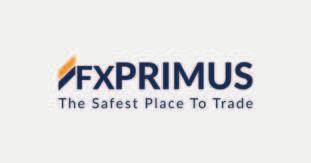
Most Trusted BrokerSouth-East Asia & Africa 2020
FXPRIMUS is one of the most secure online trading environments in the industry.
Operating since 2009, it offers marketleading innovations and rewards for traders of all experience levels with opportunities to be sustainably successful in the online trading of forex, commodities, energies and indices. This is re昀氀ected in the company’s three pillared strategy which is to provide safety to traders through the best possible academic, technical and practical support in their trading journey.

Ethical Investment Innovation of the Year
G-Coin believes gold is a powerful wealth protector and they’ve made it their mission to make it more sustainable and accessible to everyone.
G-Coin is a digital title of ownership to Responsible GoldTM. 1 G-Coin token equals 1 gram of con昀氀ict-free and responsibly sourced gold; which has been tracked and registered in their blockchain from miner, to re昀椀ner, to vault. Unlike cryptocurrencies, G-Coin is a digital representation of a real asset. They have combined the best qualities of traditional gold – stability, security, and value con昀椀dence – with the bene昀椀ts of digital currency innovation. This gives users the freedom to send and receive value instantly, and at no cost from the convenience of the G-Coin app.
With headquarters in Houston, Texas; G-Coin is currently available in selected states of the United States, with plans to launch in new markets in 2021.


Best Overall Forex BrokerGlobal 2020
Established in 2013, GKFX (AKFX Financial Services Ltd.) is a Malta-based brokerage company and a part of the Global Kapital Group (GKG). Relying on the group’s expertise and know-how, GKFX steadily holds a top place among the best brokers in Europe. GKG has been in the Forex and CFD brokerage business since 2010. With 28 of昀椀ces in 18 countries, the group provides various 昀椀nancial services to over one million clients worldwide.
GKFX offers brokerage services for its clients in Europe with top-tier standards. Regulated by MiFID (Markets in Financial Instruments Directive), GKFX is fully compliant with ESMA (The European Securities and Markets Authority) restrictions and provides its services in the EU and EEA (European Economic Area) countries.
Serving both retail and professional clients, GKFX has processed over 300 million client transactions so far and continues delivering effective multiasset CFD trading with more than 500 instruments. The company provides topnotch local support for its +20,000 active traders in 5 languages for 24 hours during trading days. Also, traders can 昀椀nd daily analysis articles, latest market news, and weekly analysis videos for free. On top of that, GKFX offers free educational material in e-book and video explainer formats.
Always prioritising client satisfaction, GKFX steadily built a loyal client base over the years, and with constant innovation, they aim to meet their clients’ ever-changing needs.

Best Partners Program // Excellence in Customer ServiceGlobal 2020
Established in 2010, HotForex is a registered brand name of HF Markets (SV) Ltd, a part of the HF Markets Group of companies.
HotForex has already joined the ranks of the World Finance Top 100; a great honour earned for excellence in offering innovative products, outstanding customer service and unparalleled trading conditions. In just ten years, it already boasts:
• Over 2,000,000 live accounts opened
• 40+ industry awards
• 24/5 customer service
• Support in more than 27 languages
HotForex clients enjoy an award-winning client-centric experience. They can diversify their portfolios with CFDs on forex, metals and energies, indices, shares, commodities, ETFs, DMA Stocks, Bonds or Cryptocurrencies. In addition, a wide range of account types, trading tools and educational resources are available for traders of all levels of experience.
Clients choose HotForex for its quick and fee-free registration and deposits, low spreads, negative balance protection and market leading security of funds measures.
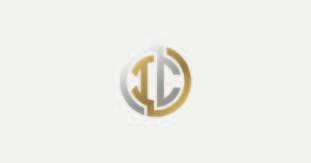
Best Corporate ConsultancyCEE 2020
Established in 2003, InTERCORP Holdings S.A. is a Romanian Joint-Stock Holding Company with fully private share capital of 243 Mil Euro & a market value in 2020 of almost 500 Mil Euro.
INTERCORP has business partners & operates internationally, being a founding member of the R.O.C.C.I.J.A, established in Tokyo in 2014, the only Romanian Chamber of Commerce based in Japan. InTERCORP was founded by Mr. CristianStefan Stan, an internationally experienced businessman & VP of R.O.C.C.I.J.A., on the grounds of adding value and always aiming for excellence.
INTERCORP manages a wide range of securities. Strong values and the passion for growth are the keys which help us maintain our top level of performance.
InTERCORP also controls activities in various 昀椀elds, such as buildings insulation works for residential, commercial & industrial properties - glass wall partitions, curtain wall design & installation, PVC & Aluminum joinery, and so forth. We use premium materials and cutting edge technology which guarantee a wide range of A-class products.
It all comes down to having a growth plan and permanently being client-focused, the reason our motto is: Excellence Is a Continuous Process.

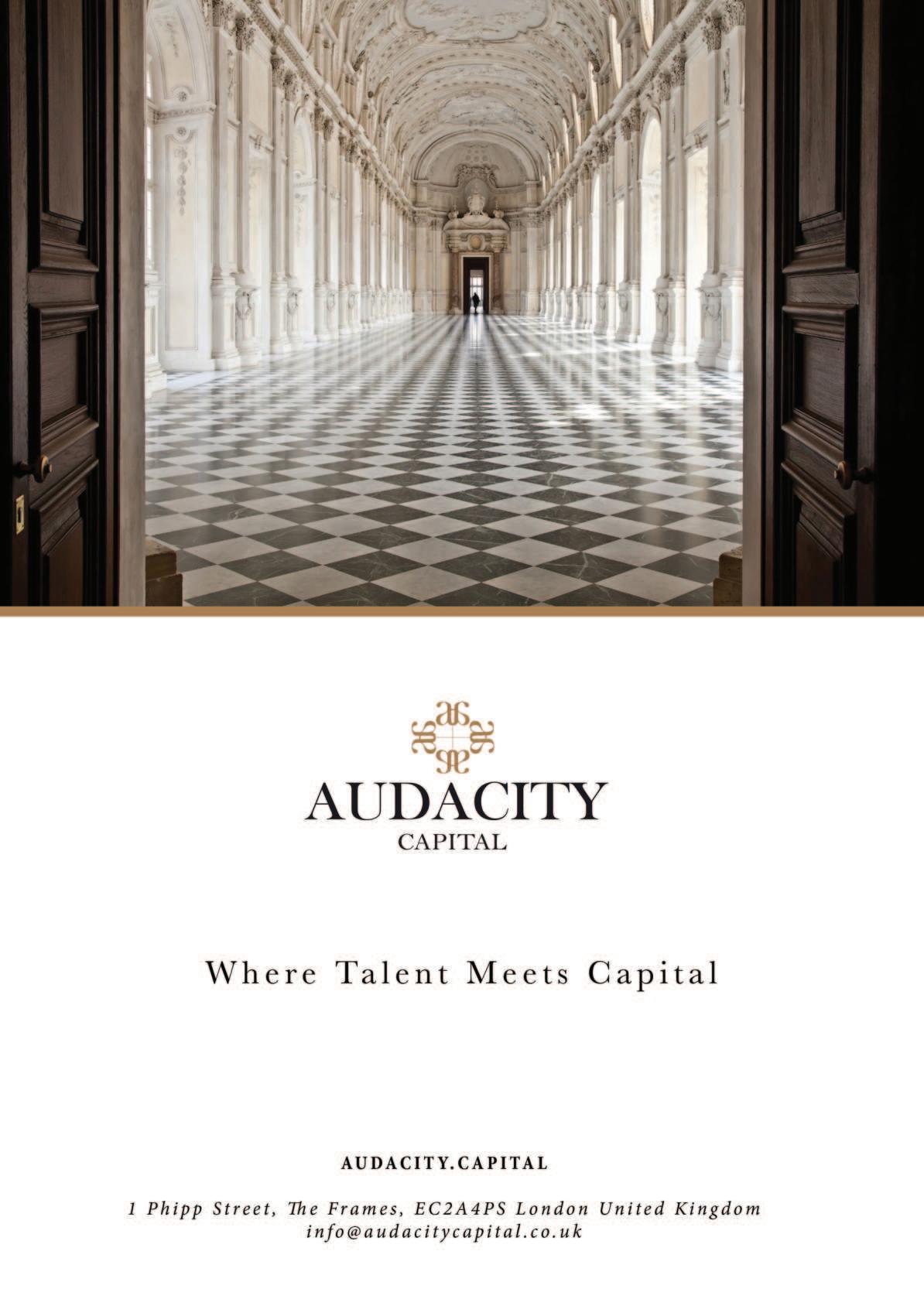



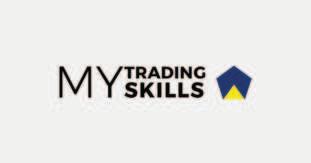
FDI Agency of the YearMiddle East & North Africa 2020
As the Sharjah FDI Of昀椀ce, we are dedicated to the continued transformation and economic diversi昀椀cation of the emirate and committed to guiding foreign investors through a bespoke step-by-step facilitation process.
Leveraging our superior market knowledge and intelligence, we guide investors to the right opportunities in Sharjah and provide bespoke advice and guidance, that help individuals and organisations establish successfully in the emirate.
Working actively and collaboratively with public institutions and private companies, we help guide your business, growth and success by identifying, promoting and facilitating investment in all sectors, with a focus on Travel & Leisure, Transport & Logistics, Healthcare, Environment, Education and Light Manufacturing.
Outstanding Businesswoman of the Year - Oman 2020
The origin of Mohsin Haider Darwish LLC dates back to over half a century. The family proprietary business was converted to its present form of a corporate entity in 1987. Over the decades, the company has witnessed phenomenal progress, helped by strategic planning and professional management.
The growth of the company has kept pace with the tremendous progress the Sultanate of Oman has achieved under the wise and able leadership of the late His Majesty Sultan Qaboos bin Said. now, guided by His Majesty Sultan Haitham bin Taimur, MHD remains committed to supporting the vision of growth and development under his strong leadership.
From its inception till date, the steep growth of MHD LLC exempli昀椀es the tremendous progress Oman has made as a nation. MHD LLC is one of the oldest and leading business houses in the Sultanate, representing world-renowned companies catering to the ever-growing customer base in the Sultanate.
MHD LLC’s business divisions have two main verticals:
• Automotive, Construction Equipment and Renewable Energy (ACERE)
• Infrastructure, Technology, Industrial and Consumer Solutions (ITICS)
Best Trading Courses // Europe 2020
My Trading Skills is an award-winning, accredited provider of online education for individuals wanting to learn about the 昀椀nancial markets, private trading and how to start doing it themselves using their own capital. Its courses have helped 1,000s of people approach trading in a rational, balanced manner.
My Trading Skills equips its students with the right skill sets to trade over the long term, con昀椀dently and consistently, whilst avoiding many of the common pitfalls. The skills taught cover an extensive range of technical and fundamental analysis techniques, risk management, trading psychology, planning and strategy. This is done in a supportive, unpressured and encouraging environment, where the emphasis is on practical application.
Founded in 2017, the business offers over 25 online courses for a range of experience levels, a trading community and a wide range of free resources to help improve everyone’s trading skills.


Most Innovative Guest Engagement Solutions for Hospitality
OKKAMI is the world leader in digital guest engagement and staff management platform solutions for the hospitality industry. OKKAMI currently provides fully integrated solutions for some of the largest hotel groups and shopping malls in the industry.
OKKAMI was founded in 2016 to cater to travellers and enhance all aspects of their journey. The company provides businesses in the hospitality industry with guest engagement technology platforms to better connect with customers, 昀椀nalise transactions, and improve guest satisfaction. The platform also includes managed in-room devices in addition to downloadable applications for both iOS and Android.
As of today, OKKAMI provides products and features to over 100 customers globally across north America, Europe, and Asia. The OKKAMI solution includes over 50+ integrations with leading hospitality vendors allowing hassle-free connection of third-party services. OKKAMI is an allin-one solution to integrate with hotel systems such as PMS, POS, lighting, door locks, loyalty programmes, spa bookings and more.

Investment House of the YearOman 2020
Ubhar Capital SAOC (U Capital) is a leading full service investment banking 昀椀rm regulated by the Capital Market Authority (CMA) in Oman. U Capital commenced operations in January 2017 after the shareholders of OAB decided to spin off the ‘Investment Management Group’ of the bank (which had been operating since April 1998) to a standalone 昀椀rm. U Capital has strong institutional shareholders, namely: Ominvest, Arab Bank (Switzerland) and Jabreen Capital.
U Capital has a team of 55 investment professionals and offers comprehensive services that include Asset Management, Wealth Management, Brokerage, Corporate Finance & Advisory, Research and Custody. U Capital has USD 1.2 billion in assets under management and custody and ranked as one of the top brokers on the Muscat Securities Market consistently since inception.
U Capital team has raised USD 10.1 billion for investment banking transactions and has successfully managed 17 IPOs and over 40 secondary issues and 15 debt advisory assignments. U Capital’s Asset Management division has a strong track record of managing funds and discretionary portfolios for clients.
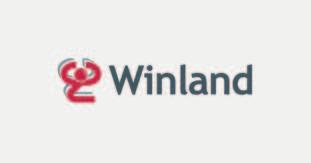
Most Distinguished Wealth Management Firm of the YearEast Asia 2020
Winland is a unique wealth management 昀椀rm providing exclusive investment services to local and offshore investors. The company connects clients with the world by offering a global platform of investment choices supported by a group of professional expertise. Committed to servicing wealthy families and privileged individuals for half a century, their core principle is to focus on understanding clients’ needs and delivering solutions according to their objectives and risk pro昀椀le. Through dedicated services, diversi昀椀ed platforms and tailored investment solutions; Winland has become a trustworthy wealth management 昀椀rm where investors can depend on them as their reliable 昀椀nancial advisor.
Winland Wealth Management has access to over 50 global exchanges and a vast range of 昀椀nancial services including stocks, bonds, ETPs, funds, and structured products. In addition, they offer various alternative investment choices including real estate investments (e.g. residential, property development and hotel properties), direct forestry investment, physical commodities (e.g. gold, diamonds and gemstones), rare and 昀椀ne liquor (e.g. casks, vintage Scotch Whisky), private equity, private debt, venture capital, 昀椀ne arts and a variety of life and general insurance products as part of overall protection just to highlight a few.
Winland have also re昀椀ned a clientcentric, risk-appropriate technique, and tailored portfolio strategy in the selection of investments. This is very different to other “run-of-the-mill” brokerage houses or banks where they may not have such ability to do so.




